CREEDS AND CONFESSIONS
THE APOSTLES CREED
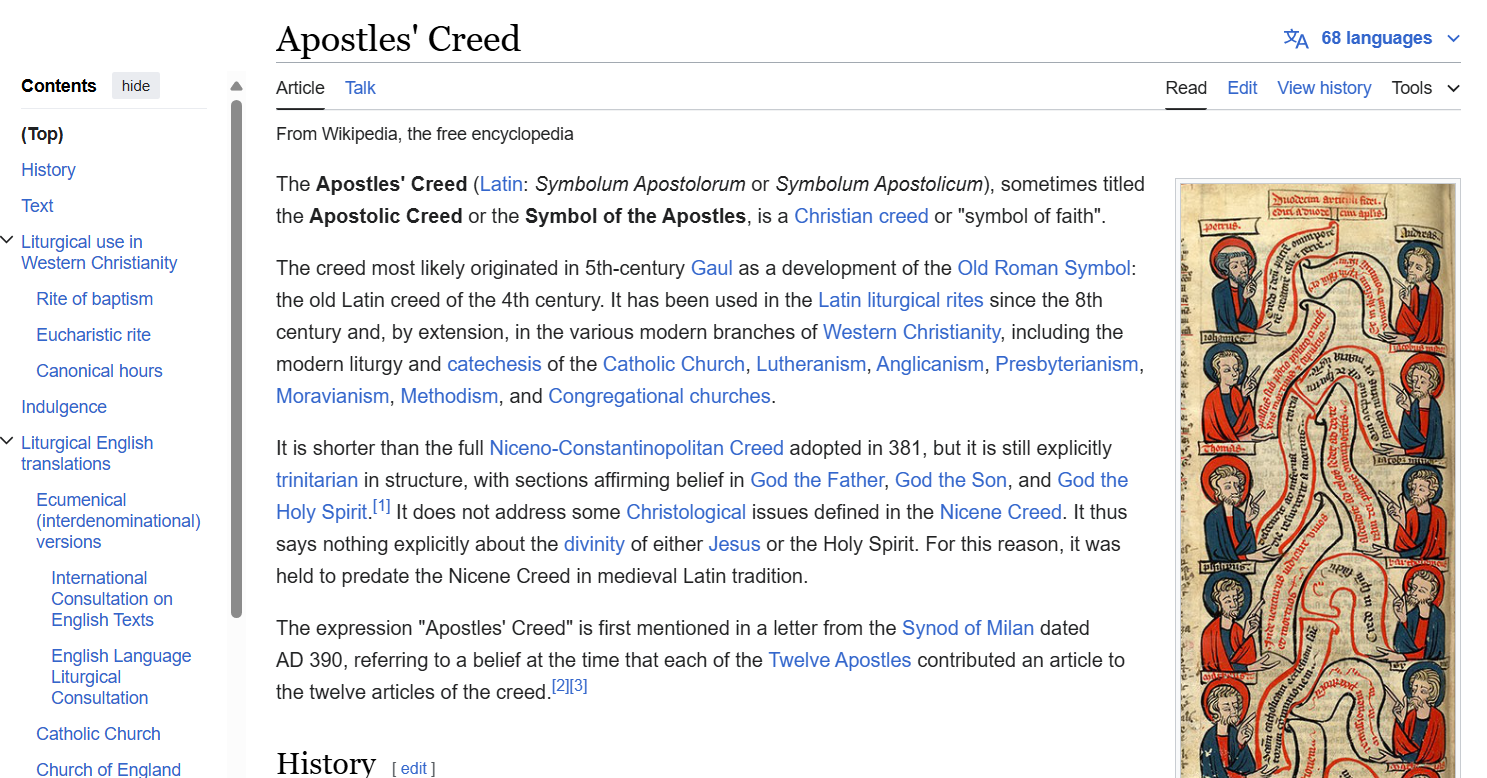
The Apostles' Creed (Latin: Symbolum Apostolorum or Symbolum Apostolicum), sometimes titled the Apostolic Creed or the Symbol of the Apostles, is a Christian creed or "symbol of faith".
The creed most likely originated in 5th-century Gaul as a development of the Old Roman Symbol, the old Latin creed of the 4th century. It has been in liturgical use in the Latin rite since the 8th century and, by extension, in the various modern branches of Western Christianity, including the modern liturgy and catechesis of the Catholic Church, Lutheranism, Anglicanism, Presbyterianism, Moravianism, Methodism, and Congregational churches.
It is shorter than the full Niceno-Constantinopolitan Creed adopted in 381, but it is still explicitly trinitarian in structure, with sections affirming belief in God the Father, God the Son, and God the Holy Spirit.[1] It does not address some Christological issues defined in the Nicene Creed. It thus says nothing explicitly about the divinity of either Jesus or the Holy Spirit. For this reason, it was held to predate the Nicene Creed in medieval Latin tradition.
The expression "Apostles' Creed" is first mentioned in a letter from the Synod of Milan dated AD 390, referring to a belief at the time that each of the Twelve Apostles contributed an article to the twelve articles of the creed.[2][3]
I believe in God, the Father almighty,
creator of heaven and earth.
I believe in Jesus Christ, his only Son, our Lord,
who was conceived by the Holy Spirit
and born of the virgin Mary.
He suffered under Pontius Pilate,
was crucified, died, and was buried;
he descended
to hell.
The third day he rose again from the dead.
He ascended to heaven
and is seated at the right hand of God the Father almighty.
From there he will come to judge the living and the dead.
I believe in the Holy Spirit,
the holy catholic church,
the communion of saints,
the
forgiveness of sins,
the resurrection of the body,
and the life everlasting.
Amen.
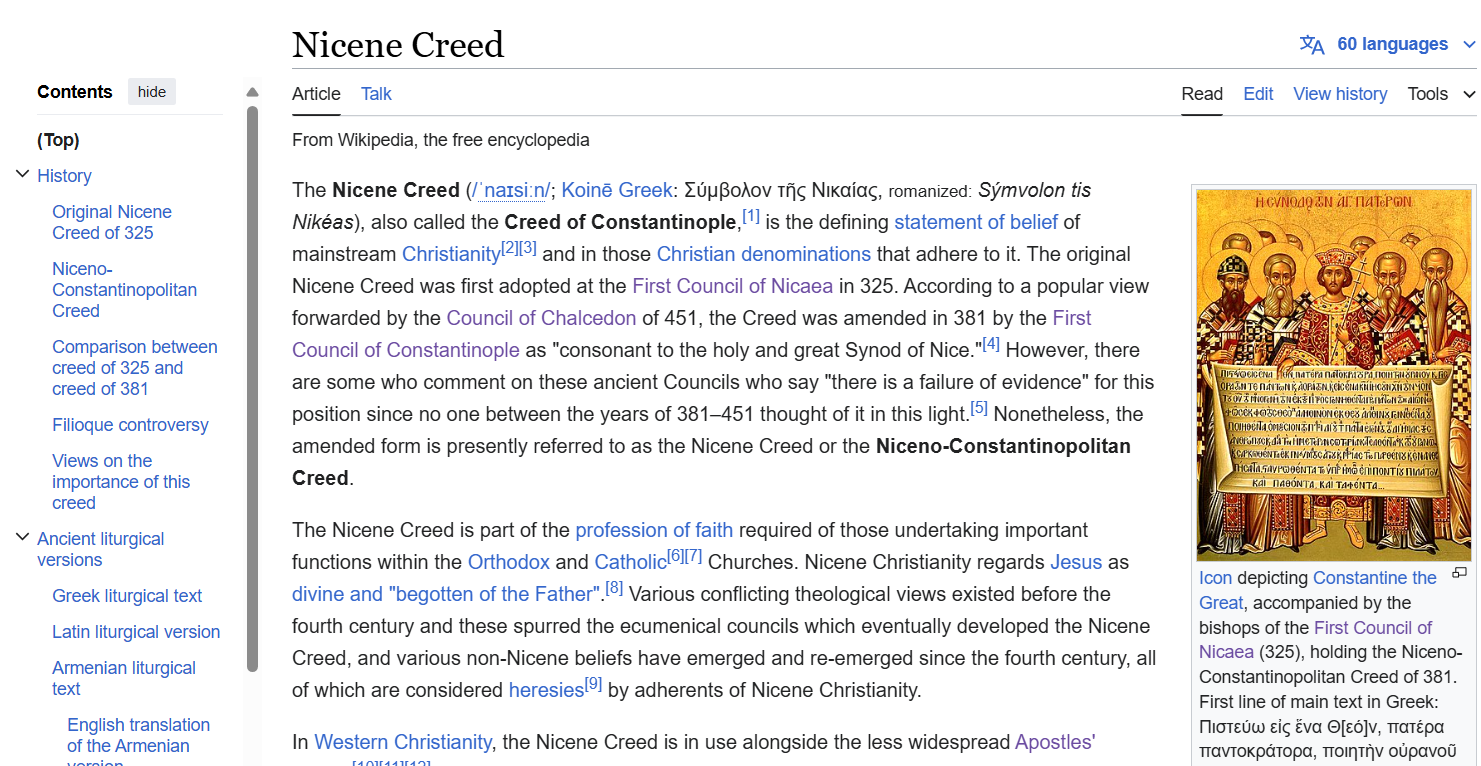
THE NICENE CREED
The original Nicene Creed (/ˈnaɪsiːn/; Greek: Σύμβολον τῆς Νικαίας; Latin: Symbolum Nicaenum) was first adopted at the First Council of Nicaea in 325. In 381, it was amended at the First Council of Constantinople. The amended form is also referred to as the Nicene Creed, or the Niceno-Constantinopolitan Creed for disambiguation.
The Nicene Creed is the defining statement of belief of Nicene or mainstream Christianity[1][2] and in those Christian denominations that adhere to it. The Nicene Creed is part of the profession of faith required of those undertaking important functions within the Orthodox and Catholic[3][4] Churches.
Nicene Christianity regards Jesus as divine and "begotten of the Father". Various non-Nicene doctrines, beliefs, and creeds have been formed since the fourth century, all of which are considered heresies[5] by adherents of Nicene Christianity.
In Western Christianity, the Nicene Creed is in use alongside the less widespread Apostles' Creed.[6][7][8] In musical settings, particularly when sung in Latin, this creed is usually referred to by its first word, Credo. On Sundays and solemnities, one of these two creeds is recited in the Roman Rite Mass after the homily. In the Byzantine Rite, the Nicene Creed is sung or recited at the Divine Liturgy, immediately preceding the Anaphora (eucharistic prayer), and is also recited daily at compline.[9][10]
I believe in one God,
the Father almighty,
maker of heaven and earth,
of all things visible and invisible.
I believe in one Lord Jesus Christ,
the Only Begotten Son of God,
born of the Father before all ages.
God from God, Light from Light,
true God from true God,
begotten,
not made, consubstantial with the Father;
through him all things were made.
For us men and for our salvation
he came down from heaven,
and by the Holy Spirit was incarnate of the Virgin Mary,
and became
man.
For our sake he was crucified under Pontius Pilate,
he suffered death and was buried,
and rose again on the third day
in accordance with the Scriptures.
He ascended into heaven
and is seated
at the right hand of the Father.
He will come again in glory
to judge the living and the dead
and his kingdom will have no end.
I believe in the Holy Spirit, the Lord, the giver of life,
who proceeds from the Father and the Son,
who with the Father and the Son is adored and glorified,
who has spoken
through the prophets.
I believe in one, holy, catholic and apostolic Church.
I confess one Baptism for the forgiveness of sins
and I look forward to the resurrection of the dead
and the life
of the world to come.
Amen.
THE ATHANASIAN CREED
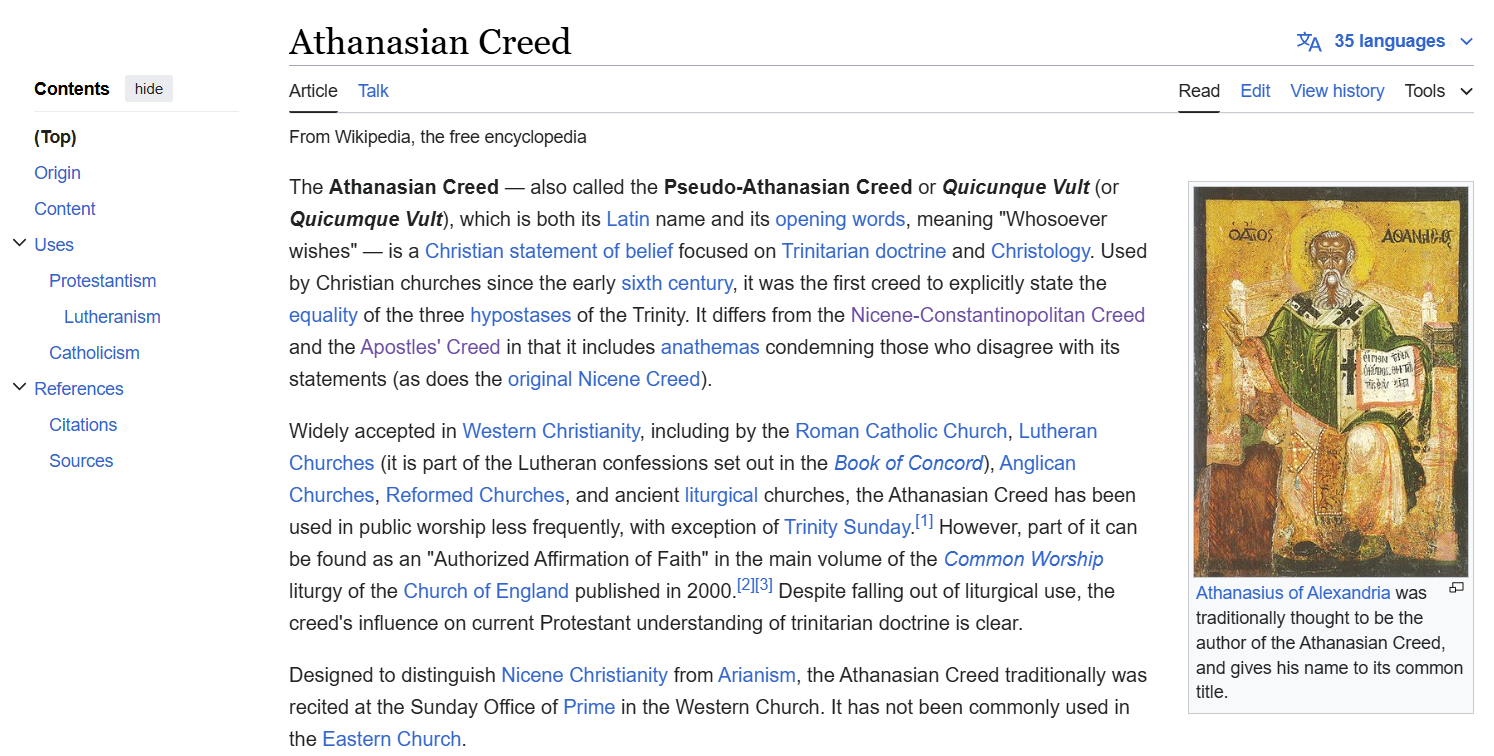
The Athanasian Creed, also called the Pseudo-Athanasian Creed and sometimes known as Quicunque Vult (or Quicumque Vult), which is both its Latin name and its opening words, meaning "Whosoever wishes", is a Christian statement of belief focused on Trinitarian doctrine and Christology. Used by Christian churches since the sixth century, it was the first creed to explicitly state the equality of the three hypostases of the Trinity. It differs from the Nicene-Constantinopolitan Creed and the Apostles' Creed in that it includes anathemas condemning those who disagree with its statements (as does the original Nicene Creed).
Widely accepted in Western Christianity, including by the Roman Catholic Church, some Anglican and Lutheran churches (it is part of the Lutheran confessions set out in the Book of Concord), and ancient liturgical churches, the Athanasian Creed over time has been used in public worship less and less frequently. However, part of it can be found as an "Authorized Affirmation of Faith" in the main volume of the Common Worship liturgy of the Church of England published in 2000.[1][2]
Designed to distinguish Nicene Christianity from the heresy of Arianism, the Athanasian Creed traditionally was recited at the Sunday Office of Prime in the Western Church. It has not been commonly used in the Eastern Church.
Whoever wants to be saved should above all cling to the catholic faith.
Whoever does not guard it whole and inviolable will doubtless perish eternally.
Now this is the catholic faith: We worship one God in trinity and the Trinity in unity, neither confusing the persons nor dividing the divine being.
For the Father is one person, the Son is another, and the Spirit is still another.
But the deity of the Father, Son, and Holy Spirit is one, equal in glory, coeternal in majesty.
What the Father is, the Son is, and so is the Holy Spirit.
Uncreated is the Father; uncreated is the Son; uncreated is the Spirit.
The Father is infinite; the Son is infinite; the Holy Spirit is infinite.
Eternal is the Father; eternal is the Son; eternal is the Spirit: And yet there are not three eternal beings, but one who is eternal; as there are not three uncreated and unlimited beings, but one who is uncreated and unlimited.
Almighty is the Father; almighty is the Son; almighty is the Spirit: And yet there are not three almighty beings, but one who is almighty.
Thus the Father is God; the Son is God; the Holy Spirit is God: And yet there are not three gods, but one God.
Thus the Father is Lord; the Son is Lord; the Holy Spirit is Lord: And yet there are not three lords, but one Lord.
As Christian truth compels us to acknowledge each distinct person as God and Lord, so catholic religion forbids us to say that there are three gods or lords.
The Father was neither made nor created nor begotten; the Son was neither made nor created, but was alone begotten of the Father; the Spirit was neither made nor created, but is proceeding from the Father and the Son.
Thus there is one Father, not three fathers; one Son, not three sons; one Holy Spirit, not three spirits.
And in this Trinity, no one is before or after, greater or less than the other; but all three persons are in themselves, coeternal and coequal; and so we must worship the Trinity in unity and the one God in three persons.
Whoever wants to be saved should think thus about the Trinity.
It is necessary for eternal salvation that one also faithfully believe that our Lord Jesus Christ became flesh.
For this is the true faith that we believe and confess: That our Lord Jesus Christ, God’s Son, is both God and man.
He is God, begotten before all worlds from the being of the Father, and he is man, born in the world from the being of his mother — existing fully as God, and fully as man with a rational soul and a human body; equal to the Father in divinity, subordinate to the Father in humanity.
Although he is God and man, he is not divided, but is one Christ.
He is united because God has taken humanity into himself; he does not transform deity into humanity.
He is completely one in the unity of his person, without confusing his natures.
For as the rational soul and body are one person, so the one Christ is God and man.
He suffered death for our salvation. He descended into hell and rose again from the dead.
He ascended into heaven and is seated at the right hand of the Father.
He will come again to judge the living and the dead.
At his coming all people shall rise bodily to give an account of their own deeds.
Those who have done good will enter eternal life, those who have done evil will enter eternal fire.
This is the catholic faith.
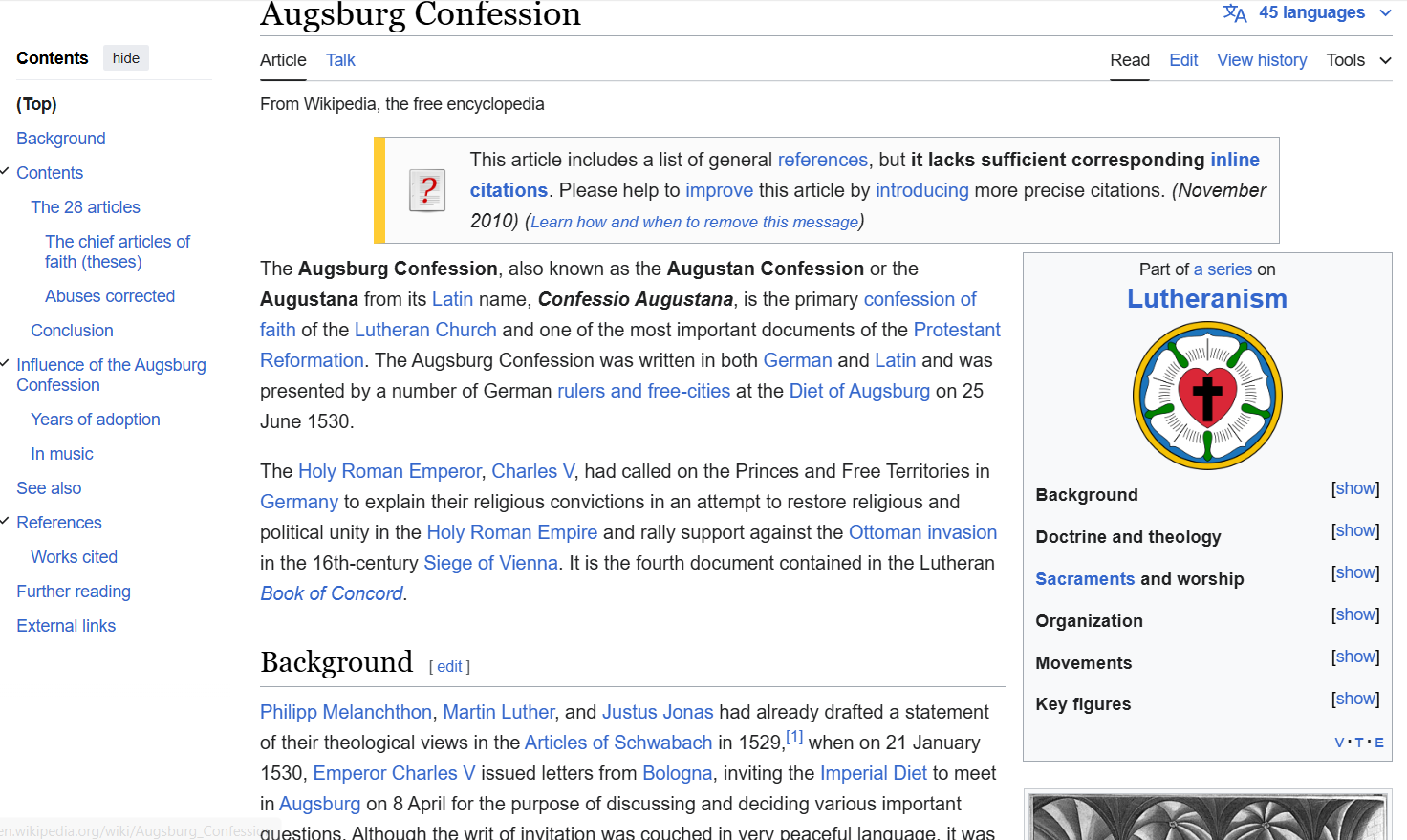
- The Augsburg Confession, also known as the Augustan Confession or the Augustana from its Latin name, Confessio Augustana, is the primary confession of faith of the Lutheran Church and one of the most important documents of the Protestant Reformation. The Augsburg Confession was written in both German and Latin and was presented by a number of German rulers and free-cities at the Diet of Augsburg on 25 June 1530.
- The Holy Roman Emperor Charles V had called on the Princes and Free Territories in Germany to explain their religious convictions in an attempt to restore religious and political unity in the Holy Roman Empire and rally support against the Ottoman invasion in the 16th century Siege of Vienna. It is the fourth document contained in the Lutheran Book of Concord.
- The 28 articles
- The Augsburg Confession consists of 28 articles presented by Lutheran princes and representatives of "free cities" at the Diet of Augsburg that set forward what the Lutherans believed, taught and confessed in positive (theses) and negative (antitheses) statements. The theses are 21 Chief Articles of Faith describing the normative principles of Christian faith held by the Lutherans; the antitheses are seven statements describing what they viewed as abuses of the Christian faith present in the Roman Catholic church.
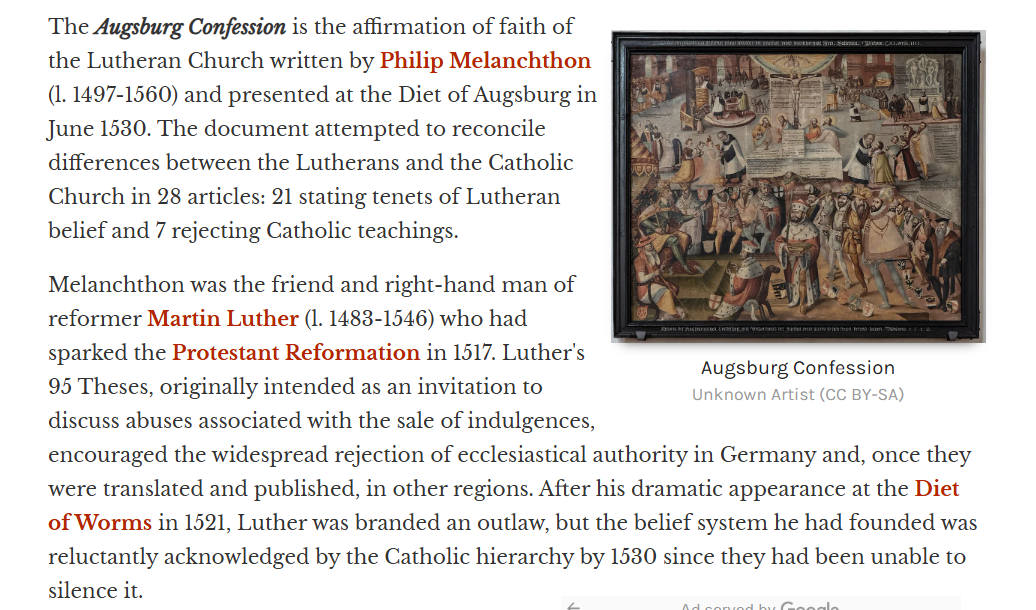
- The Augsburg Confession is the affirmation of faith of the Lutheran Church written by Philip Melanchthon (l. 1497-1560) and presented at the Diet of Augsburg in June 1530. The document attempted to reconcile differences between the Lutherans and the Catholic Church in 28 articles: 21 stating tenets of Lutheran belief and 7 rejecting Catholic teachings.
Melanchthon was the friend and right-hand man of reformer Martin Luther (l. 1483-1546) who had sparked the Protestant Reformation in 1517. Luther's 95 Theses, originally intended as an invitation to discuss abuses associated with the sale of indulgences, encouraged the widespread rejection of ecclesiastical authority in Germany and, once they were translated and published, in other regions. After his dramatic appearance at the Diet of Worms in 1521, Luther was branded an outlaw, but the belief system he had founded was reluctantly acknowledged by the Catholic hierarchy by 1530 since they had been unable to silence it.
During this same period, c. 1521-1530, Huldrych Zwingli (l. 1484-1531) had established the Reformation in Switzerland, causing further division, and in 1530, Charles V, Holy Roman Emperor (r. 1519-1556), called for an assembly at Augsburg to address the problem of Christian disunity as he feared an invasion of the region by the Ottoman Turks and needed his subjects united against them. Melanchthon wrote the Augsburg Confession (in Latin and German) to clarify Lutheran beliefs, including Luther's rejection of certain Catholic tenets, in terms acceptable to both parties.
- The document was approved by the Protestant princes in attendance but rejected by Charles V and the Catholic Church through their Pontifical Confutation of the Augsburg Confession. Even so, the Confession and other documents relating to it became the central affirmation of the Lutheran movement, which was finally recognized as a legitimate religious entity at the Peace of Augsburg in 1555. The Augsburg Confession became a rallying point for the Lutheran princes of Germany, inspired the creation of other confessions of faith, and remains the affirmation of the Lutheran Church in the present. ---
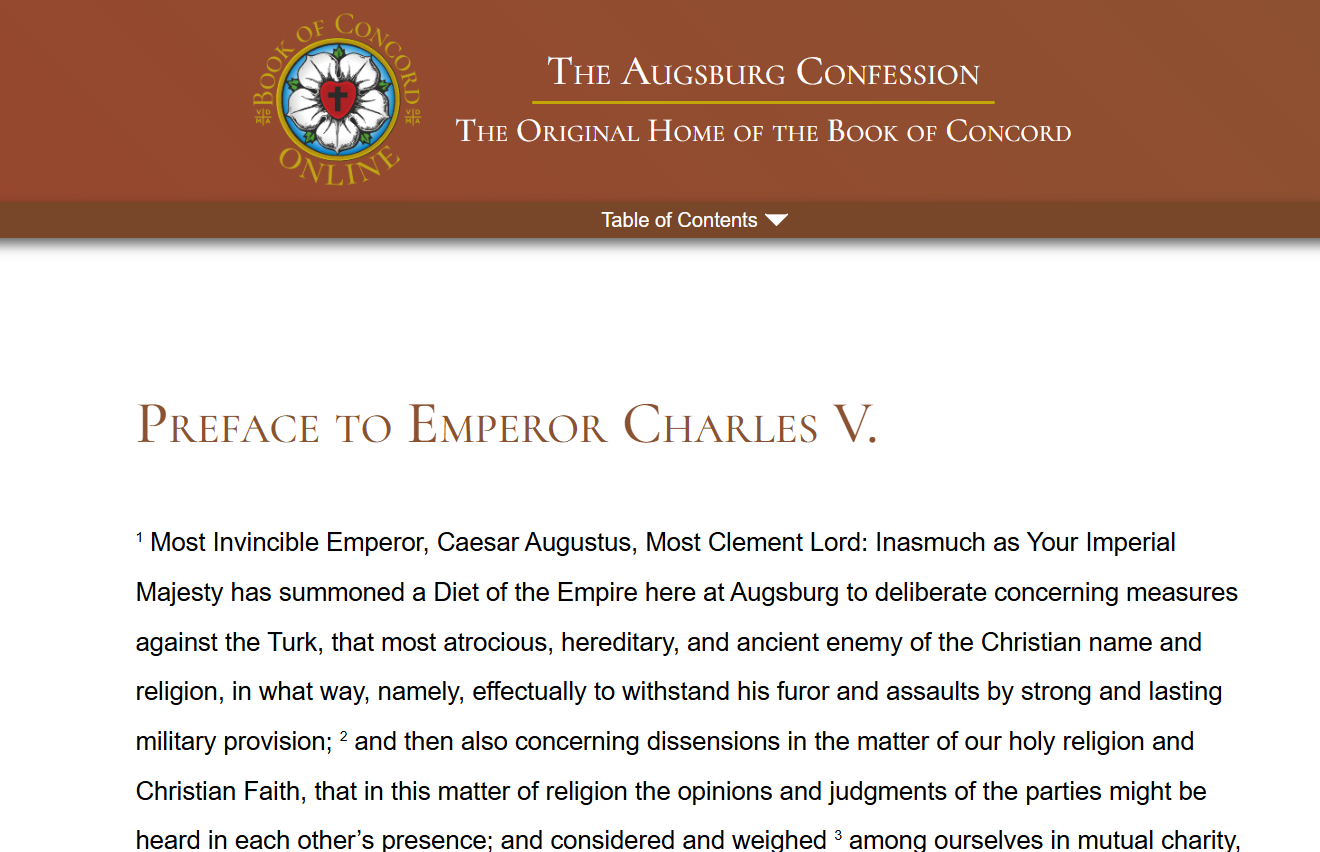
- Preface to Emperor Charles V.
- 1 Most Invincible Emperor, Caesar Augustus, Most Clement Lord: Inasmuch as Your Imperial Majesty has summoned a Diet of the Empire here at Augsburg to deliberate concerning measures against the Turk, that most atrocious, hereditary, and ancient enemy of the Christian name and religion, in what way, namely, effectually to withstand his furor and assaults by strong and lasting military provision; 2 and then also concerning dissensions in the matter of our holy religion and Christian Faith, that in this matter of religion the opinions and judgments of the parties might be heard in each other’s presence; and considered and weighed 3 among ourselves in mutual charity, leniency, and kindness, in order that, after the removal and correction of such things as have been treated and understood in a different manner in the writings on either side, these matters may be settled and brought back to one simple truth and Christian concord, 4 that for the future one pure and true religion may be embraced and maintained by us, that as we all are under one Christ and do battle under Him, so we may be able also to live in unity and concord in the one Christian Church. ---
THE THIRTY NINE ARTICLES (Anglican 1563)
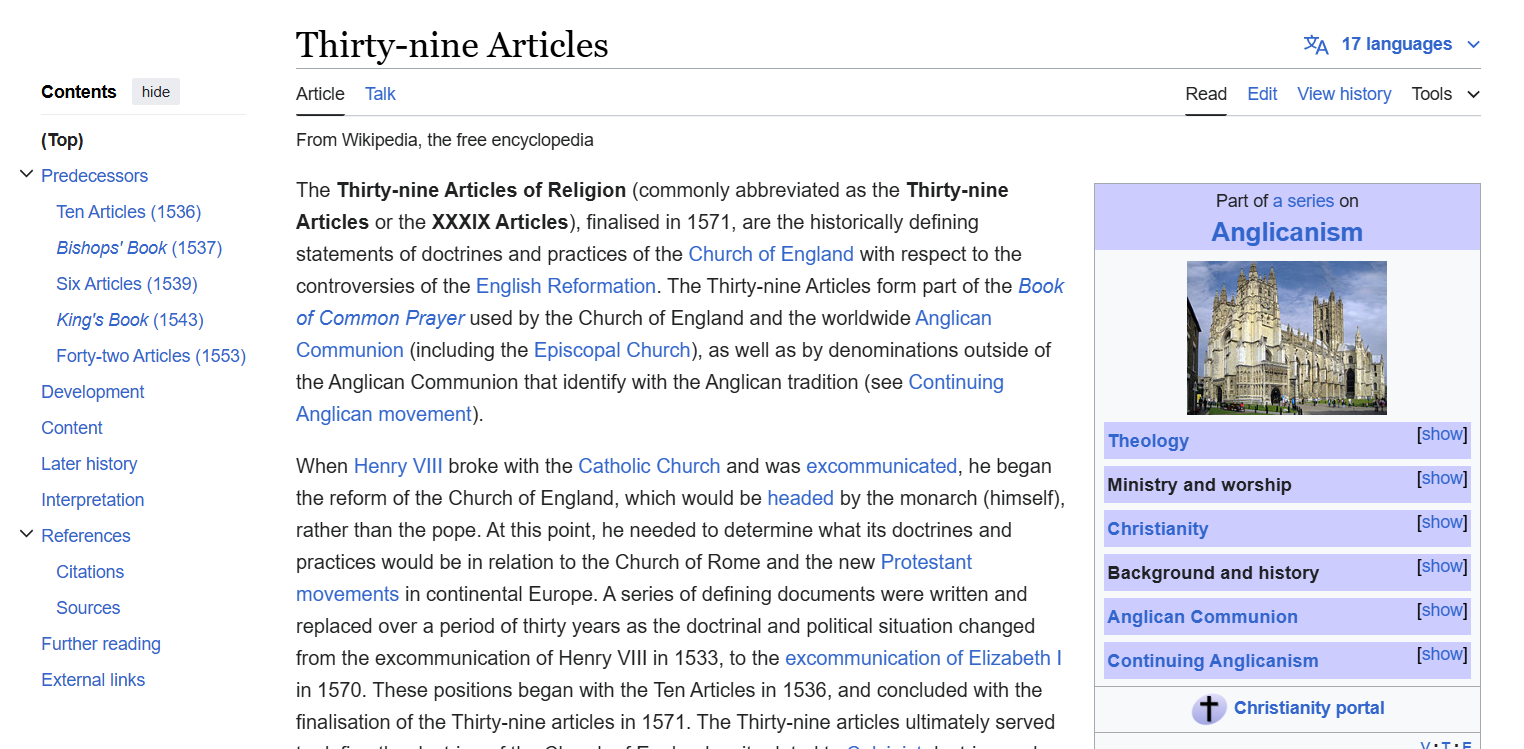
Thirty-nine Articles - Wikipedia
The Thirty-nine Articles of Religion (commonly abbreviated as the Thirty-nine Articles or the XXXIX Articles) are the historically defining statements of doctrines and practices of the Church of England with respect to the controversies of the English Reformation. The Thirty-nine Articles form part of the Book of Common Prayer used by both the Church of England, the U.S. Episcopal Church, and the Anglican Church of North America (ACNA) among other denominations in the worldwide Anglican Communion and Anglican Continuum.
When Henry VIII broke with the Roman Catholic Church and was excommunicated, he began the reform of the Church of England, which would be headed by the monarch (himself), rather than the pope. At this point, he needed to determine what its doctrines and practices would be in relation to the Church of Rome and the new Protestant movements in continental Europe. A series of defining documents were written and replaced over a period of thirty years as the doctrinal and political situation changed from the excommunication of Henry VIII in 1533, to the excommunication of Elizabeth I in 1570. These positions began with the Ten Articles in 1536, and concluded with the finalisation of the Thirty-nine articles in 1571. The Thirty-nine articles ultimately served to define the doctrine of the Church of England as it related to Calvinist doctrine and Roman Catholic practice.[1]
The articles went through at least five major revisions prior to their finalisation in 1571. The first attempt was the Ten Articles in 1536, which showed some slightly Protestant leanings – the result of an English desire for a political alliance with the German Lutheran princes.[2] The next revision was the Six Articles in 1539 which swung away from all reformed positions,[2] and then the King's Book in 1543, which re-established most of the earlier Roman Catholic doctrines. During the reign of Edward VI, Henry VIII's son, the Forty-two Articles were written under the direction of Archbishop Thomas Cranmer in 1552. It was in this document that Calvinist thought reached the zenith of its influence in the English Church. These articles were never put into action, owing to Edward VI's death and the reversion of the English Church to Roman Catholicism under Henry VIII's elder daughter, Mary I.
Finally, upon the coronation of Elizabeth I and the re-establishment of the Church of England as separate from the Roman Catholic Church, the Thirty-nine Articles of Religion were initiated by the Convocation of 1563, under the direction of Matthew Parker, the Archbishop of Canterbury.
The Thirty-nine Articles were finalised in 1571, and incorporated into the Book of Common Prayer. Although not the end of the struggle between Catholic and Protestant monarchs and citizens, the book helped to standardise the English language, and was to have a lasting effect on religion in the United Kingdom and elsewhere through its wide use.[3]
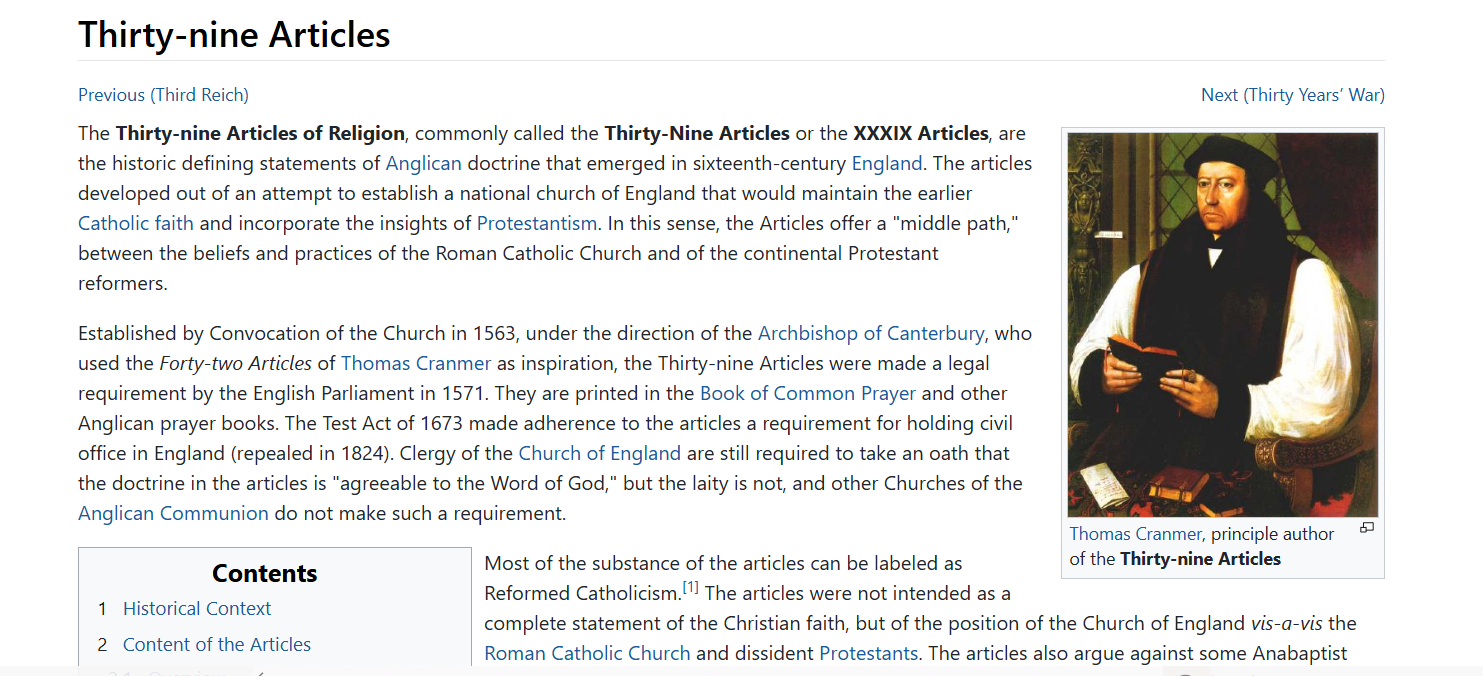
Thirty-nine Articles - New World Encyclopedia
The Thirty-nine Articles of Religion, commonly called the Thirty-Nine Articles or the XXXIX Articles, are the historic defining statements of Anglican doctrine that emerged in sixteenth-century England. The articles developed out of an attempt to establish a national church of England that would maintain the earlier Catholic faith and incorporate the insights of Protestantism. In this sense, the Articles offer a "middle path," between the beliefs and practices of the Roman Catholic Church and of the continental Protestant reformers.
Established by Convocation of the Church in 1563, under the direction of the Archbishop of Canterbury, who used the Forty-two Articles of Thomas Cranmer as inspiration, the Thirty-nine Articles were made a legal requirement by the English Parliament in 1571. They are printed in the Book of Common Prayer and other Anglican prayer books. The Test Act of 1673 made adherence to the articles a requirement for holding civil office in England (repealed in 1824). Clergy of the Church of England are still required to take an oath that the doctrine in the articles is "agreeable to the Word of God," but the laity is not, and other Churches of the Anglican Communion do not make such a requirement.
Historical Context
In sixteenth-century England, there was an absence of a general consensus on matters of faith following King Henry VIII's separation with Rome. There was a concern that dissenters who wanted the Reformation to go much further (by, for example, abolishing hierarchies of bishops), would increase in influence. Wishing to pursue Elizabeth I's agenda of establishing a national church that would maintain the indigenous Catholic faith and incorporate the insights of Protestantism, the articles were intended to incorporate a balance of theology and doctrine, thus appealing to the broadest domestic opinion. In this sense, the articles reveal a window into the ethos and character of Anglicanism in the sixteenth century, in particular in the way the document works to navigate a via media, or "middle path," between the beliefs and practices of the Roman Catholic Church and of the continental Protestant reformers.
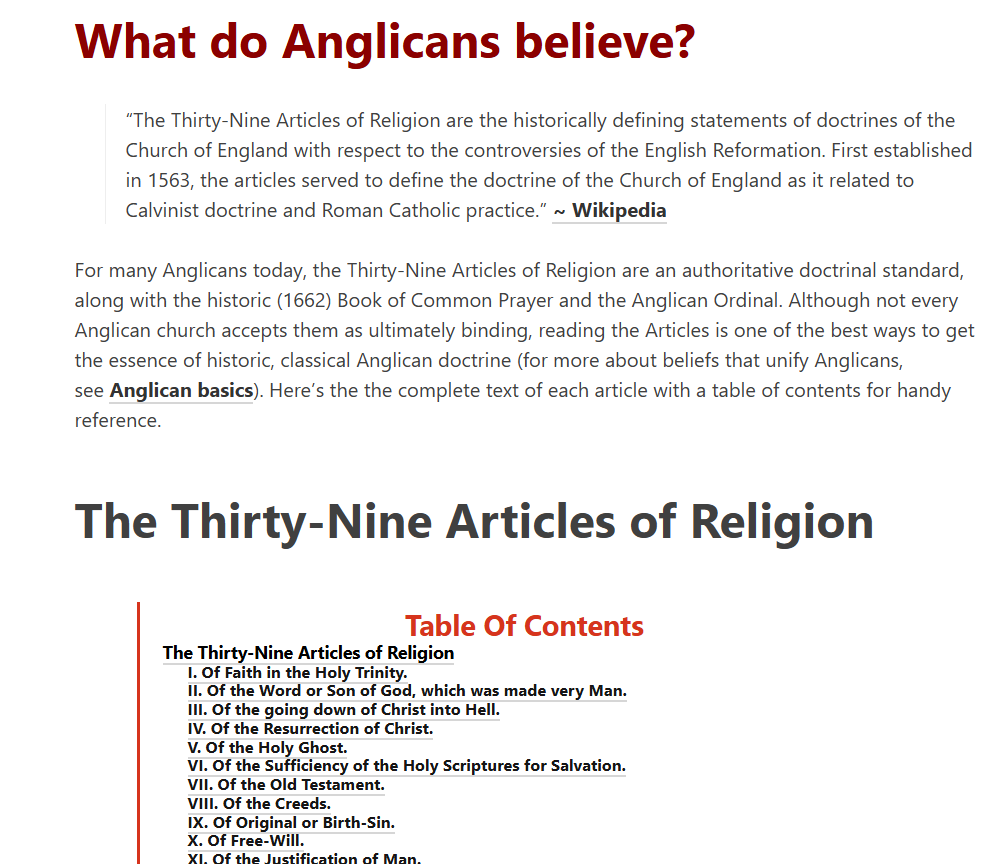
The Thirty-Nine Articles of Religion
I. Of Faith in the Holy Trinity.
II. Of the Word or Son of God, which was made very Man.
III. Of the going down of Christ into Hell.
IV. Of the Resurrection of Christ.
VI. Of the Sufficiency of the Holy Scriptures for Salvation.
XI. Of the Justification of Man.
XIII. Of Works before Justification.
XIV. Of Works of Supererogation.
XV. Of Christ alone without Sin.
XVII. Of Predestination and Election.
XVIII. Of obtaining eternal Salvation only by the Name of Christ.
XX. Of the Authority of the Church.
XXI. Of the Authority of General Councils.
XXIII. Of Ministering in the Congregation.
XXIV. Of Speaking in the Congregation in such a Tongue as the people understandeth.
XXVI. Of the Unworthiness of the Ministers, which hinders not the effect of the Sacraments.
XXIX. Of the Wicked, which eat not the Body of Christ in the use of the Lord’s Supper.
XXXI. Of the one Oblation of Christ finished upon the Cross.
XXXII. Of the Marriage of Priests.
XXXIII. Of excommunicate Persons, how they are to be avoided.
XXXIV. Of the Traditions of the Church.
XXXVI. Of Consecration of Bishops and Ministers.
XXXVII. Of the Power of the Civil Magistrates.
XXXVIII. Of Christian Men’s Goods, which are not common.
XXXIX. Of a Christian Man’s Oath.
I. Of Faith in the Holy Trinity.
There is but one living and true God, everlasting, without body, parts, or passions; of infinite power, wisdom, and goodness; the Maker, and Preserver of all things both visible and invisible. And in unity of this Godhead there be three Persons, of one substance, power, and eternity; the Father, the Son, and the Holy Ghost.
II. Of the Word or Son of God, which was made very Man.
The Son, which is the Word of the Father, begotten from everlasting of the Father, the very and eternal God, and of one substance with the Father, took Man’s nature in the womb of the blessed Virgin, of her substance: so that two whole and perfect Natures, that is to say, the Godhead and Manhood, were joined together in one Person, never to be divided, whereof is one Christ, very God, and very Man; who truly suffered, was crucified, dead, and buried, to reconcile his Father to us, and to be a sacrifice, not only for original guilt, but also for actual sins of men.
III. Of the going down of Christ into Hell.
As Christ died for us, and was buried, so also is it to be believed, that he went down into Hell.
IV. Of the Resurrection of Christ.
Christ did truly rise again from death, and took again his body, with flesh, bones, and all things appertaining to the perfection of Man’s nature; wherewith he ascended into Heaven, and there sitteth, until he return to judge all Men at the last day.
V. Of the Holy Ghost.
The Holy Ghost, proceeding from the Father and the Son, is of one substance, majesty, and glory, with the Father and the Son, very and eternal God.
VI. Of the Sufficiency of the Holy Scriptures for Salvation.
Holy Scripture containeth all things necessary to salvation: so that whatsoever is not read therein, nor may be proved thereby, is not to be required of any man, that it should be believed as an article of the Faith, or be thought requisite or necessary to salvation. In the name of the Holy Scripture we do understand those canonical Books of the Old and New Testament, of whose authority was never any doubt in the Church.
Of the Names and Number of the Canonical Books.
Genesis, The First Book of Samuel, The Book of Esther,
Exodus, The Second Book of Samuel, The Book of Job,
Leviticus, The First Book of Kings, The Psalms,
Numbers, The Second Book of Kings, The Proverbs,
Deuteronomy, The First Book of Chronicles, Ecclesiastes or Preacher,
Joshua, The Second Book of Chronicles, Cantica, or Songs of Solomon,
Judges, The First Book of Esdras, Four Prophets the greater,
Ruth, The Second Book of Esdras, Twelve Prophets the less.
And the other Books (as Hierome saith) the Church doth read for example of life and instruction of manners; but yet doth it not apply them to establish any doctrine; such are these following:
The Third Book of Esdras, The rest of the Book of Esther,
The Fourth Book of Esdras, The Book of Wisdom,
The Book of Tobias, Jesus the Son of Sirach,
The Book of Judith, Baruch the Prophet,
The Song of the Three Children, The Prayer of Manasses,
The Story of Susanna, The First Book of Maccabees,
Of Bel and the Dragon, The Second Book of Maccabees.
All the Books of the New Testament, as they are commonly received, we do receive, and account them Canonical.
VII. Of the Old Testament.
The Old Testament is not contrary to the New: for both in the Old and New Testament everlasting life is offered to Mankind by Christ, who is the only Mediator between God and Man, being both God and Man. Wherefore they are not to be heard, which feign that the old Fathers did look only for transitory promises. Although the Law given from God by Moses, as touching Ceremonies and Rites, do not bind Christian men, nor the Civil precepts thereof ought of necessity to be received in any commonwealth; yet notwithstanding, no Christian man whatsoever is free from the obedience of the Commandments which are called Moral.
VIII. Of the Creeds.
The Nicene Creed, and that which is commonly called the Apostles’ Creed, ought thoroughly to be received and believed: for they may be proved by most certain warrants of Holy Scripture.
The original Article given Royal assent in 1571 and reaffirmed in 1662, was entitled “Of the Three Creeds; and began as follows, “The Three Creeds, Nicene Creed, Athanasius’s Creed, and that which is commonly called the Apostles’ Creed …”
IX. Of Original or Birth-Sin.
Original sin standeth not in the following of Adam, (as the Pelagians do vainly talk;) but it is the fault and corruption of the Nature of every man, that naturally is engendered of the offspring of Adam; whereby man is very far gone from original righteousness, and is of his own nature inclined to evil, so that the flesh lusteth always contrary to the Spirit; and therefore in every person born into this world, it deserveth God’s wrath and damnation. And this infection of nature doth remain, yea in them that are regenerated; whereby the lust of the flesh, called in Greek, p¢vnæa sapk¢s, (which some do expound the wisdom, some sensuality, some the affection, some the desire, of the flesh), is not subject to the Law of God. And although there is no condemnation for them that believe and are baptized; yet the Apostle doth confess, that concupiscence and lust hath of itself the nature of sin.
X. Of Free-Will.
The condition of Man after the fall of Adam is such, that he cannot turn and prepare himself, by his own natural strength and good works, to faith; and calling upon God. Wherefore we have no power to do good works pleasant and acceptable to God, without the grace of God by Christ preventing us, that we may have a good will, and working with us, when we have that good will.
XI. Of the Justification of Man.
We are accounted righteous before God, only for the merit of our Lord and Saviour Jesus Christ by Faith, and not for our own works or deservings. Wherefore, that we are justified by Faith only, is a most wholesome Doctrine, and very full of comfort, as more largely is expressed in the Homily of Justification.
XII. Of Good Works.
Albeit that Good Works, which are the fruits of Faith, and follow after Justification, cannot put away our sins, and endure the severity of God’s judgment; yet are they pleasing and acceptable to God in Christ, and do spring out necessarily of a true and lively Faith insomuch that by them a lively Faith may be as evidently known as a tree discerned by the fruit.
XIII. Of Works before Justification.
Works done before the grace of Christ, and the Inspiration of his Spirit, are not pleasant to God, forasmuch as they spring not of faith in Jesus Christ; neither do they make men meet to receive grace, or (as the School-authors say) deserve grace of congruity: yea rather, for that they are not done as God hath willed and commanded them to be done, we doubt not but they have the nature of sin.
XIV. Of Works of Supererogation.
Voluntary Works besides, over and above, God’s Commandments, which they call Works of Supererogation, cannot be taught without arrogancy and impiety: for by them men do declare, that they do not only render unto God as much as they are bound to do, but that they do more for his sake, than of bounden duty is required: whereas Christ saith plainly When ye have done all that are commanded to you, say, We are unprofitable servants.
XV. Of Christ alone without Sin.
Christ in the truth of our nature was made like unto us in all things, sin only except, from which he was clearly void, both in his flesh, and in his spirit. He came to be the Lamb without spot, who, by sacrifice of himself once made, should take away the sins of the world; and sin (as Saint John saith) was not in him. But all we the rest, although baptized and born again in Christ, yet offend in many things; and if we say we have no sin, we deceive ourselves, and the truth is not in us.
XVI. Of Sin after Baptism.
Not every deadly sin willingly committed after Baptism is sin against the Holy Ghost, and unpardonable. Wherefore the grant of repentance is not to be denied to such as fall into sin after Baptism. After we have received the Holy Ghost, we may depart from grace given, and fall into sin, and by the grace of God we may arise again, and amend our lives. And therefore they are to be condemned, which say, they can no more sin as long as they live here, or deny the place of forgiveness to such as truly repent.
XVII. Of Predestination and Election.
Predestination to Life is the everlasting purpose of God, whereby (before the foundations of the world were laid) he hath constantly decreed by his counsel secret to us, to deliver from curse and damnation those whom he hath chosen in Christ out of mankind, and to bring them by Christ to everlasting salvation, as vessels made to honour. Wherefore, they which be endued with so excellent a benefit of God, be called according to God’s purpose by his Spirit working in due season: they through Grace obey the calling: they be justified freely: they be made sons of God by adoption: they be made like the image of his only-begotten Son Jesus Christ: they walk religiously in good works, and at length, by God’s mercy, they attain to everlasting felicity.
As the godly consideration of Predestination, and our Election in Christ, is full of sweet, pleasant, and unspeakable comfort to godly persons, and such as feel in themselves the working of the Spirit of Christ, mortifying the works of the flesh, and their earthly members, and drawing up their mind to high and heavenly things, as well because it doth greatly establish and confirm their faith of eternal Salvation to be enjoyed through Christ as because it doth fervently kindle their love towards God: So, for curious and carnal persons, lacking the Spirit of Christ, to have continually before their eyes the sentence of God’s Predestination, is a most dangerous downfall, whereby the Devil doth thrust them either into desperation, or into wretchlessness of most unclean living, no less perilous than desperation.
Furthermore, we must receive God’s promises in such wise, as they be generally set forth to us in Holy Scripture: and, in our doings, that Will of God is to be followed, which we have expressly declared unto us in the Word of God.
XVIII. Of obtaining eternal Salvation only by the Name of Christ.
They also are to be had accursed that presume to say, That every man shall be saved by the Law or Sect which he professeth, so that he be diligent to frame his life according to that Law, and the light of Nature. For Holy Scripture doth set out unto us only the Name of Jesus Christ, whereby men must be saved.
XIX. Of the Church.
The visible Church of Christ is a congregation of faithful men, in which the pure Word of God is preached, and the Sacraments be duly ministered according to Christ’s ordinance, in all those things that of necessity are requisite to the same.
As the Church of Jerusalem, Alexandria, and Antioch, have erred, so also the Church of Rome hath erred, not only in their living and manner of Ceremonies, but also in matters of Faith.
XX. Of the Authority of the Church.
The Church hath power to decree Rites or Ceremonies, and authority in Controversies of Faith: and yet it is not lawful for the Church to ordain any thing that is contrary to God’s Word written, neither may it so expound one place of Scripture, that it be repugnant to another. Wherefore, although the Church be a witness and a keeper of Holy Writ, yet, as it ought not to decree any thing against the same, so besides the same ought it not to enforce any thing to be believed for necessity of Salvation.
XXI. Of the Authority of General Councils.
[The Twenty-first of the former Articles is omitted; because it is partly of a local and civil nature, and is provided for, as to the remaining parts of it, in other Articles.]
The original 1571, 1662 text of this Article, omitted in the version of 1801, reads as follows: “General Councils may not be gathered together without the commandment and will of Princes. And when they be gathered together, (forasmuch as they be an assembly of men, whereof all be not governed with the Spirit and Word of God,) they may err, and sometimes have erred, even in things pertaining unto God. Wherefore things ordained by them as necessary to salvation have neither strength nor authority, unless it may be declared that they be taken out of holy Scripture.”
XXII. Of Purgatory.
The Romish Doctrine concerning Purgatory, Pardons, Worshipping and Adoration, as well of Images as of Relics, and also Invocation of Saints, is a fond thing, vainly invented, and grounded upon no warranty of Scripture, but rather repugnant to the Word of God.
XXIII. Of Ministering in the Congregation.
It is not lawful for any man to take upon him the office of public preaching, or ministering the Sacraments in the Congregation, before he be lawfully called, and sent to execute the same. And those we ought to judge lawfully called and sent, which be chosen and called to this work by men who have public authority given unto them in the Congregation, to call and send Ministers into the Lord’s vineyard.
XXIV. Of Speaking in the Congregation in such a Tongue as the people understandeth.
It is a thing plainly repugnant to the Word of God, and the custom of the Primitive Church to have public Prayer in the Church, or to minister the Sacraments, in a tongue not understanded of the people.
XXV. Of the Sacraments.
Sacraments ordained of Christ be not only badges or tokens of Christian men’s profession, but rather they be certain sure witnesses, and effectual signs of grace, and God’s good will towards us, by the which he doth work invisibly in us, and doth not only quicken, but also strengthen and confirm our Faith in him.
There are two Sacraments ordained of Christ our Lord in the Gospel, that is to say, Baptism, and the Supper of the Lord.
Those five commonly called Sacraments, that is to say, Confirmation, Penance, Orders, Matrimony, and Extreme Unction, are not to be counted for Sacraments of the Gospel, being such as have grown partly of the corrupt following of the Apostles, partly are states of life allowed in the Scriptures, but yet have not like nature of Sacraments with Baptism, and the Lord’s Supper, for that they have not any visible sign or ceremony ordained of God.
The Sacraments were not ordained of Christ to be gazed upon, or to be carried about, but that we should duly use them. And in such only as worthily receive the same, they have a wholesome effect or operation: but they that receive them unworthily, purchase to themselves damnation, as Saint Paul saith.
XXVI. Of the Unworthiness of the Ministers, which hinders not the effect of the Sacraments.
Although in the visible Church the evil be ever mingled with the good, and sometimes the evil have chief authority in the Ministration of the Word and Sacraments, yet forasmuch as they do not the same in their own name, but in Christ’s, and do minister by his commission and authority, we may use their Ministry, both in hearing the Word of God, and in receiving the Sacraments. Neither is the effect of Christ’s ordinance taken away by their wickedness, nor the grace of God’s gifts diminished from such as by faith, and rightly, do receive the Sacraments ministered unto them; which be effectual, because of Christ’s institution and promise, although they be ministered by evil men.
Nevertheless, it appertaineth to the discipline of the Church, that inquiry be made of evil Ministers, and that they be accused by those that have knowledge of their offences; and finally, being found guilty, by just judgment be deposed.
XXVII. Of Baptism.
Baptism is not only a sign of profession, and mark of difference, whereby Christian men are discerned from others that be not christened, but it is also a sign of Regeneration or New-Birth, whereby, as by an instrument, they that receive Baptism rightly are grafted into the Church; the promises of the forgiveness of sin, and of our adoption to be the sons of God by the Holy Ghost, are visibly signed and sealed, Faith is confirmed, and Grace increased by virtue of prayer unto God.
The Baptism of young Children is in any wise to be retained in the Church, as most agreeable with the institution of Christ.
XXVIII. Of the Lord’s Supper.
The Supper of the Lord is not only a sign of the love that Christians ought to have among themselves one to another, but rather it is a Sacrament of our Redemption by Christ’s death: insomuch that to such as rightly, worthily, and with faith, receive the same, the Bread which we break is a partaking of the Body of Christ; and likewise the Cup of Blessing is a partaking of the Blood of Christ.
Transubstantiation (or the change of the substance of Bread and Wine) in the Supper of the Lord, cannot be proved by Holy Writ; but is repugnant to the plain words of Scripture, overthroweth the nature of a Sacrament, and hath given occasion to many superstitions.
The Body of Christ is given, taken, and eaten, in the Supper, only after an heavenly and spiritual manner. And the mean whereby the Body of Christ is received and eaten in the Supper, is Faith.
The Sacrament of the Lord’s Supper was not by Christ’s ordinance reserved, carried about, lifted up, or worshipped.
XXIX. Of the Wicked, which eat not the Body of Christ in the use of the Lord’s Supper.
The Wicked, and such as be void of a lively faith, although they do carnally and visibly press with their teeth (as Saint Augustine saith) the Sacrament of the Body and Blood of Christ; yet in no wise are they partakers of Christ: but rather, to their condemnation, do eat and drink the sign or Sacrament of so great a thing.
XXX. Of both Kinds.
The Cup of the Lord is not to be denied to the Lay-people: for both the parts of the Lord’s Sacrament, by Christ’s ordinance and commandment, ought to be ministered to all Christian men alike.
XXXI. Of the one Oblation of Christ finished upon the Cross.
The Offering of Christ once made is that perfect redemption, propitiation, and satisfaction, for all the sins of the whole world, both original and actual; and there is none other satisfaction for sin, but that alone. Wherefore the sacrifices of Masses, in the which it was commonly said, that the Priest did offer Christ for the quick and the dead, to have remission of pain or guilt, were blasphemous fables, and dangerous deceits.
XXXII. Of the Marriage of Priests.
Bishops, Priests, and Deacons, are not commanded by God’s Law, either to vow the estate of single life, or to abstain from marriage: therefore it is lawful for them, as for all other Christian men, to marry at their own discretion, as they shall judge the same to serve better to godliness.
XXXIII. Of excommunicate Persons, how they are to be avoided.
That person which by open denunciation of the Church is rightly cut off from the unity of the Church, and excommunicated, ought to be taken of the whole multitude of the faithful, as an Heathen and Publican, until he be openly reconciled by penance, and received into the Church by a Judge that hath authority thereunto.
XXXIV. Of the Traditions of the Church.
It is not necessary that Traditions and Ceremonies be in all places one, or utterly like; for at all times they have been divers, and may be changed according to the diversity of countries, times, and men’s manners, so that nothing be ordained against God’s Word. Whosoever, through his private judgment, willingly and purposely, doth openly break the Traditions and Ceremonies of the Church, which be not repugnant to the Word of God, and be ordained and approved by common authority, ought to be rebuked openly, (that others may fear to do the like,) as he that offendeth against the common order of the Church, and hurteth the authority of the Magistrate, and woundeth the consciences of the weak brethren.
Every particular or national Church hath authority to ordain, change, and abolish, Ceremonies or Rites of the Church ordained only by man’s authority, so that all things be done to edifying.
XXXV. Of the Homilies.
The Second Book of Homilies, the several titles whereof we have joined under this Article, doth contain a godly and wholesome Doctrine, and necessary for these times, as doth the former Book of Homilies, which were set forth in the time of Edward the Sixth; and therefore we judge them to be read in Churches by the Ministers, diligently and distinctly, that they may he understanded of the people.
Of the Names of the Homilies.
1 Of the right Use of the Church.
2 Against Peril of Idolatry.
3 Of repairing and keeping clean of Churches.
4 Of good Works: first of Fasting.
5 Against Gluttony and Drunkenness.
6 Against Excess of Apparel.
7 Of Prayer.
8 Of the Place and Time of Prayer.
9 That Common Prayers and Sacraments ought to be ministered in a known tongue.
10 Of the reverend Estimation of God’s Word.
11 Of Alms-doing.
12 Of the Nativity of Christ.
13 Of the Passion of Christ.
14 Of the Resurrection of Christ.
15 Of the worthy receiving of the Sacrament of the Body and Blood of Christ.
16 Of the Gifts of the Holy Ghost.
17 For the Rogation-days.
18 Of the State of Matrimony.
19 Of Repentance.
20 Against Idleness.
21 Against Rebellion.
[This Article is received in this Church, so far as it declares the Books of Homilies to be an explication of Christian doctrine, and instructive in piety and morals. But all references to the constitution and laws of England are considered as inapplicable to the circumstances of this Church; which also suspends the order for the reading of said Homilies in churches, until a revision of them may be conveniently made, for the clearing of them, as well from obsolete words and phrases, as from the local references.]
XXXVI. Of Consecration of Bishops and Ministers.
The Book of Consecration of Bishops, and Ordering of Priests and Deacons, as set forth by the General Convention of this Church in 1792, doth contain all things necessary to such Consecration and Ordering; neither hath it any thing that, of itself, is superstitious and ungodly. And, therefore, whosoever are consecrated or ordered according to said Form, we decree all such to be rightly, orderly, and lawfully consecrated and ordered.
The original 1571, 1662 text of this Article reads as follows: “The Book of Consecration of Archbishops and Bishops, and Ordering of Priests and Deacons, lately set forth in the time of Edward the Sixth, and confirmed at the same time by authority of Parliament, doth contain all things necessary to such Consecration and Ordering: neither hath it any thing, that of itself is superstitious and ungodly. And therefore whosoever are consecrated or ordered according to the Rites of that Book, since the second year of the forenamed King Edward unto this time, or hereafter shall be consecrated or ordered according to the same Rites; we decree all such to be rightly, orderly, and lawfully consecrated and ordered.”
XXXVII. Of the Power of the Civil Magistrates.
The Power of the Civil Magistrate extendeth to all men, as well Clergy as Laity, in all things temporal; but hath no authority in things purely spiritual. And we hold it to be the duty of all men who are professors of the Gospel, to pay respectful obedience to the Civil Authority, regularly and legitimately constituted.
The original 1571, 1662 text of this Article reads as follows: “The King’s Majesty hath the chief power in this Realm of England, and other his Dominions, unto whom the chief Government of all Estates of this Realm, whether they be Ecclesiastical or Civil, in all causes doth appertain, and is not, nor ought to be, subject to any foreign Jurisdiction. Where we attribute to the King’s Majesty the chief government, by which Titles we understand the minds of some slanderous folks to be offended; we give not our Princes the ministering either of God’s Word, or of the Sacraments, the which thing the Injunctions also lately set forth by Elizabeth our Queen do most plainly testify; but that only prerogative, which we see to have been given always to all godly Princes in holy Scriptures by God himself; that is, that they should rule all estates and degrees committed to their charge by God, whether they be Ecclesiastical or Temporal, and restrain with the civil sword the stubborn and evil-doers.
The Bishop of Rome hath no jurisdiction in this Realm of England.
The Laws of the Realm may punish Christian men with death, for heinous and grievous offences.
It is lawful for Christian men, at the commandment of the Magistrate, to wear weapons, and serve in the wars.”
XXXVIII. Of Christian Men’s Goods, which are not common.
The Riches and Goods of Christians are not common, as touching the right, title, and possession of the same; as certain Anabaptists do falsely boast. Notwithstanding, every man ought, of such things as he possesseth, liberally to give alms to the poor, according to his ability.
XXXIX. Of a Christian Man’s Oath.
As we confess that vain and rash Swearing is forbidden Christian men by our Lord Jesus Christ, and James his Apostle, so we judge, that Christian Religion doth not prohibit, but that a man may swear when the Magistrate requireth, in a cause of faith and charity, so it be done according to the Prophet’s teaching in justice, judgment, and truth.
THE FORMULA OF CONCORD (Lutheran 1577)
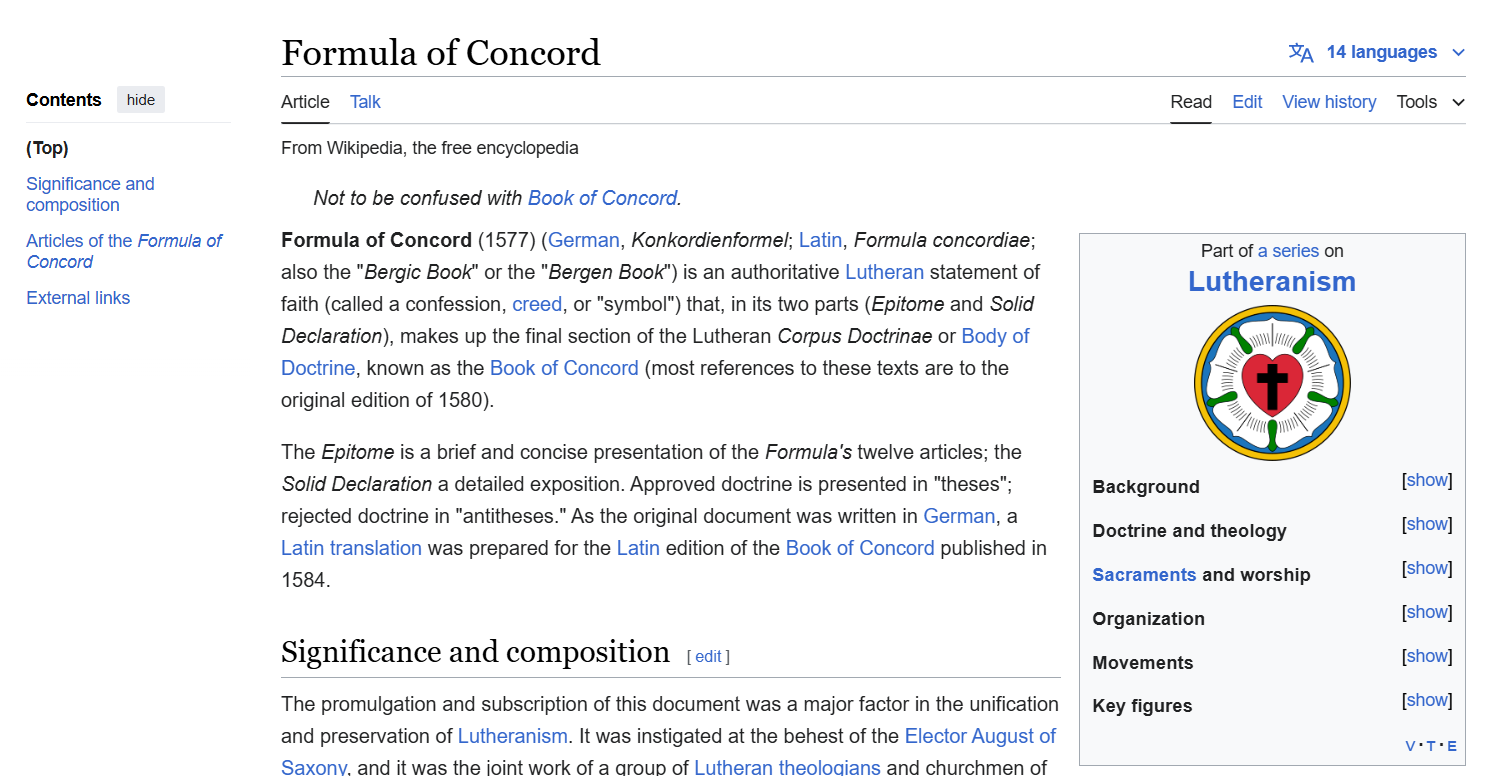
Formula of Concord (1577) (German, Konkordienformel; Latin, Formula concordiae; also the "Bergic Book" or the "Bergen Book") is an authoritative Lutheran statement of faith (called a confession, creed, or "symbol") that, in its two parts (Epitome and Solid Declaration), makes up the final section of the Lutheran Corpus Doctrinae or Body of Doctrine, known as the Book of Concord (most references to these texts are to the original edition of 1580).
The Epitome is a brief and concise presentation of the Formula's twelve articles; the Solid Declaration a detailed exposition. Approved doctrine is presented in "theses"; rejected doctrine in "antitheses." As the original document was written in German, a Latin translation was prepared for the Latin edition of the Book of Concord published in 1584.
Articles of the Formula of Concord
- I. Original Sin
- II. Free Will
- III. The Righteousness of Faith before God
- IV. Good Works
- V. Law and Gospel
- VI. The Third Use of the Law
- VII. The Holy Supper of Christ
- VIII. The Person of Christ
- IX. Christ's Descent into Hell
- X. Church Ceremonies (Adiaphora, or Indifferent Things)
- XI. The Eternal Foreknowledge and Election of God
- XII. Other heresies and sects
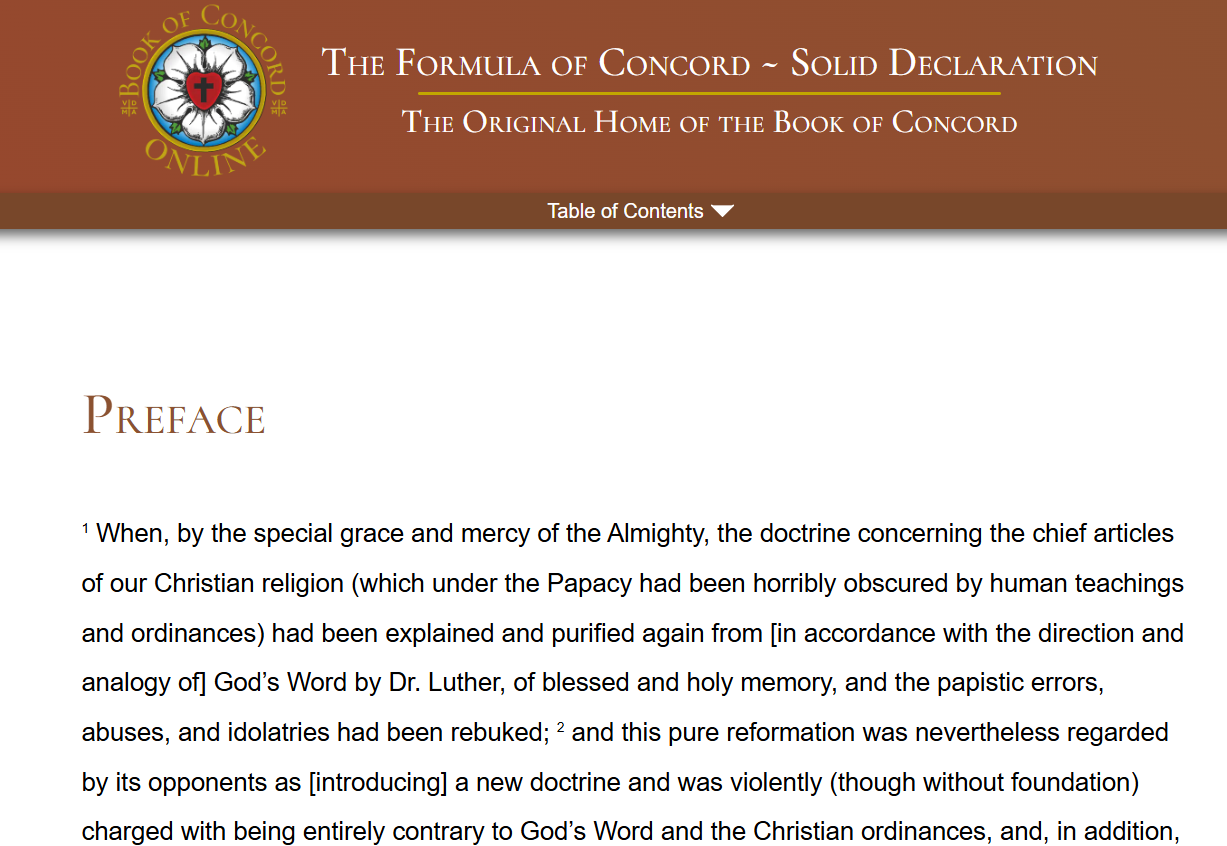
1 Since for thorough, permanent unity in the Church it is, above all things, necessary that we have a comprehensive, unanimously approved summary and form wherein is brought together from God’s Word the common doctrine, reduced to a brief compass, which the churches that are of the true Christian religion confess, just as the ancient Church always had for this use its fixed symbols; 2 moreover, since this [comprehensive form of doctrine] should not be based on private writings, but on such books as have been composed, approved, and received in the name of the churches which pledge themselves to one doctrine and religion, we have declared to one another with heart and mouth that we will not make or receive a separate or new confession of our faith, but confess the public common writings which always and everywhere were held and used as such symbols or common confessions in all the churches of the Augsburg Confession before the dissensions arose among those who accept the Augsburg Confession, and as long as in all articles there was on all sides a unanimous adherence to [and maintenance and use of] the pure doctrine of the divine Word, as the sainted Dr. Luther explained it. ---
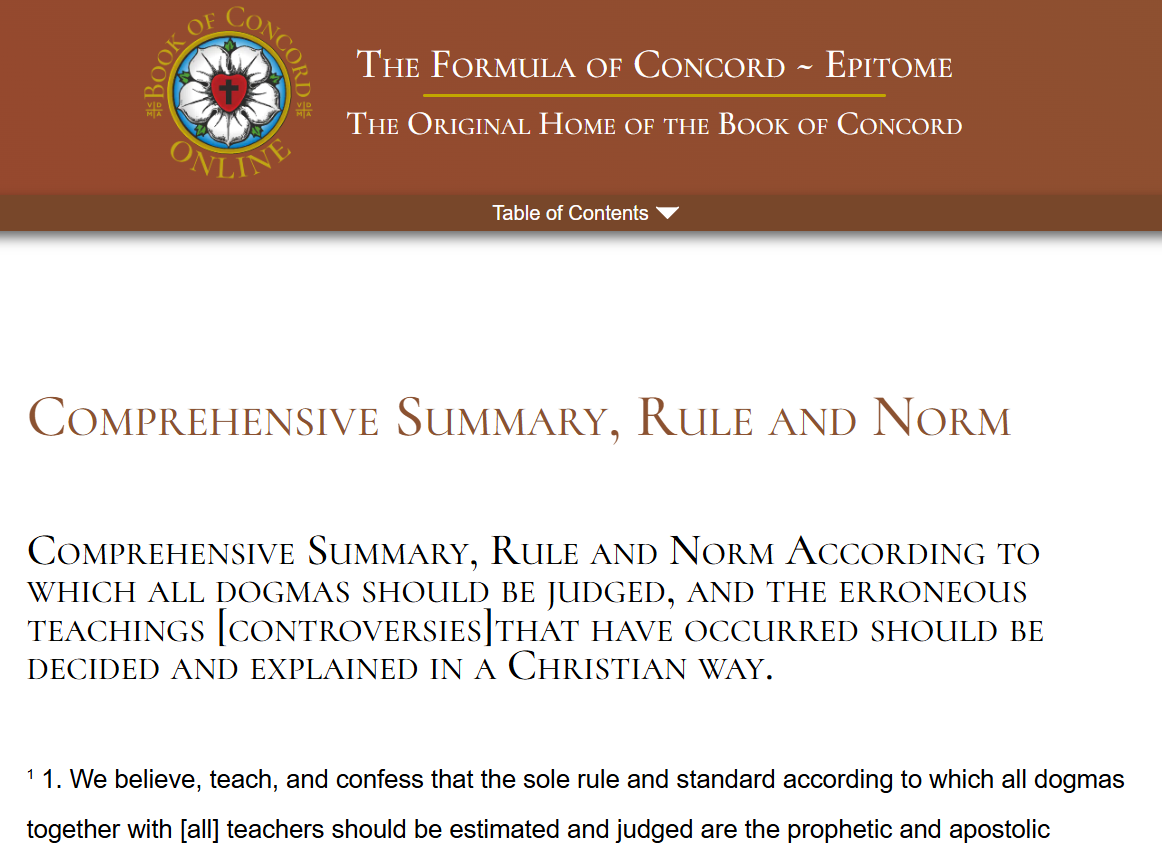
1 1. We believe, teach, and confess that the sole rule and standard according to which all dogmas together with [all] teachers should be estimated and judged are the prophetic and apostolic Scriptures of the Old and of the New Testament alone, as it is written Ps. 119:105: Thy Word is a lamp unto my feet and a light unto my path. And St. Paul: Though an angel from heaven preach any other gospel unto you, let him be accursed, Gal. 1:8.
2 Other writings, however, of ancient or modern teachers, whatever name they bear, must not be regarded as equal to the Holy Scriptures, but all of them together be subjected to them, and should not be received otherwise or further than as witnesses, [which are to show] in what manner after the time of the apostles, and at what places, this [pure] doctrine of the prophets and apostles was preserved.
3 2. And because directly after the times of the apostles, and even while they were still living, false teachers and heretics arose, and symbols, i. e., brief, succinct [categorical] confessions, were composed against them in the early Church, which were regarded as the unanimous, universal Christian faith and confession of the orthodox and true Church, namely, the Apostles' Creed, the Nicene Creed, and the Athanasian Creed, we pledge ourselves to them, and hereby reject all heresies and dogmas which, contrary to them, have been introduced into the Church of God.
continued
A number of political and theological controversies fol?lowed after the death of Martin Luther (in 1546). These controversies included the topics of Original Sin, Right?eousness, Law and Gospel, Good Works, the Lord’s Supper, Election, and more. In an attempt to settle these controversies and bring about a theological unity among the theologians of the Augsburg Confession, a meeting was held in Torgau from April until June of 1576. Momentum from this meeting inspired the writing of a confession, The Formula of Concord, a year later. ---
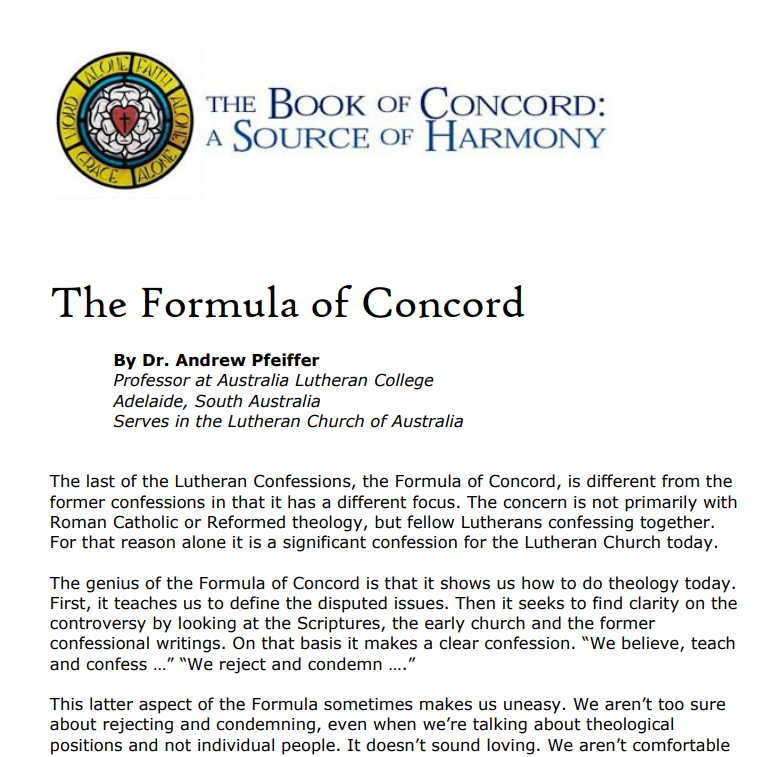
Epitome of the Formula of Concord
Comprehensive Summary, Rule and Norm According to which all dogmas should be judged, and the erroneous teachings [controversies]that have occurred should be decided and explained in a Christian way.
1] 1. We believe, teach, and confess that the sole rule and standard according to which all dogmas together with [all] teachers should be estimated and judged are the prophetic and apostolic Scriptures of the Old and of the New Testament alone, as it is written Ps. 119:105: Thy Word is a lamp unto my feet and a light unto my path. And St. Paul: Though an angel from heaven preach any other gospel unto you, let him be accursed, Gal. 1:8.
2] Other writings, however, of ancient or modern teachers, whatever name they bear, must not be regarded as equal to the Holy Scriptures, but all of them together be subjected to them, and should not be received otherwise or further than as witnesses, [which are to show] in what manner after the time of the apostles, and at what places, this [pure] doctrine of the prophets and apostles was preserved. ----
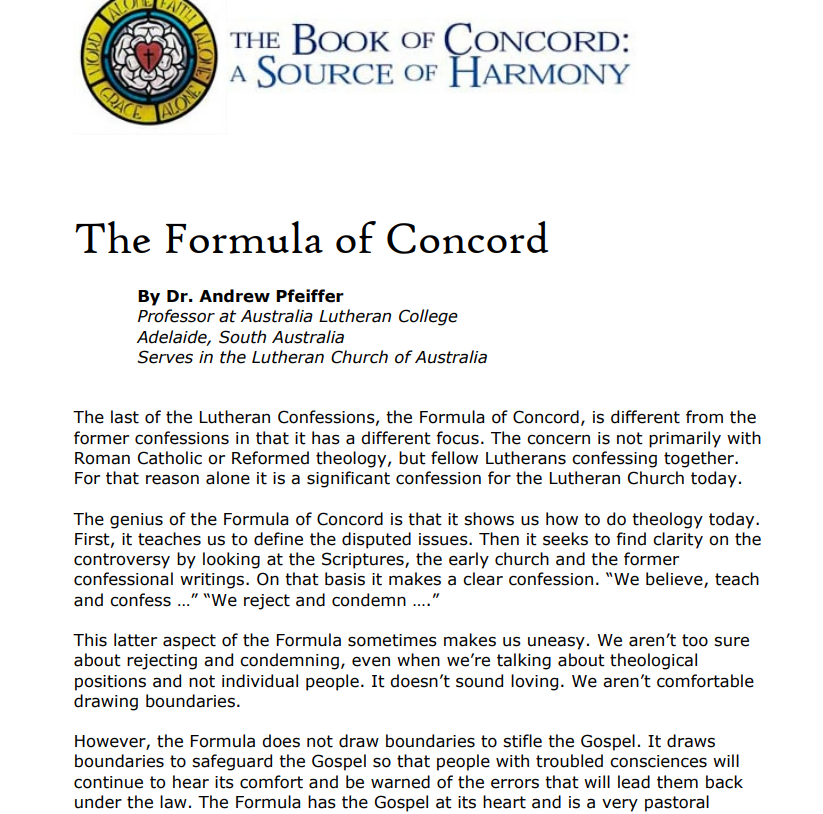
The last of the Lutheran Confessions, the Formula of Concord, is different from the former confessions in that it has a different focus. The concern is not primarily with Roman Catholic or Reformed theology, but fellow Lutherans confessing together. For that reason alone it is a significant confession for the Lutheran Church today. The genius of the Formula of Concord is that it shows us how to do theology today. First, it teaches us to define the disputed issues. Then it seeks to find clarity on the controversy by looking at the Scriptures, the early church and the former confessional writings. On that basis it makes a clear confession. “We believe, teach and confess …” “We reject and condemn ….” This latter aspect of the Formula sometimes makes us uneasy. We aren’t too sure about rejecting and condemning, even when we’re talking about theological positions and not individual people. It doesn’t sound loving. We aren’t comfortable drawing boundaries. ---
continued
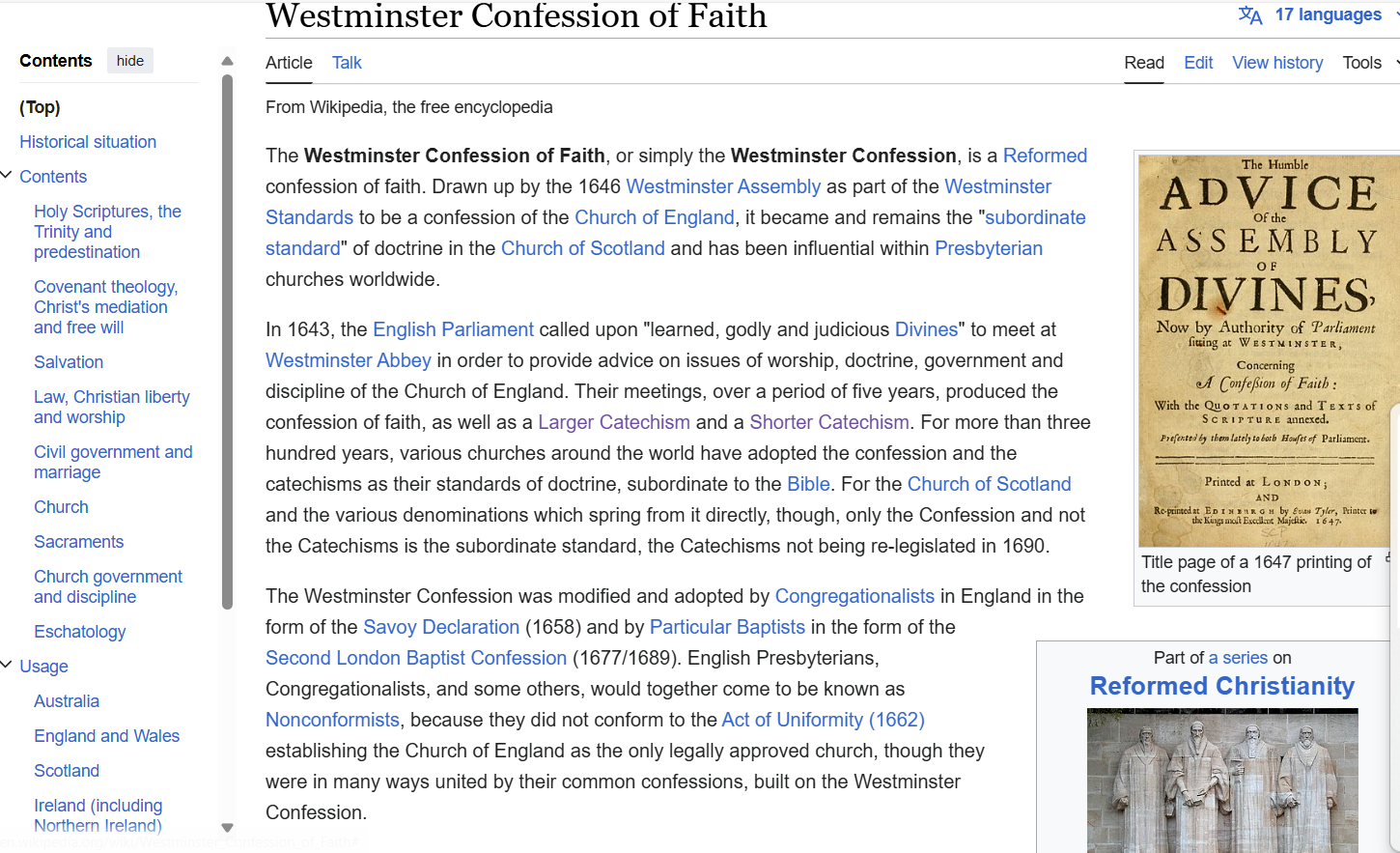
The Westminster Confession of Faith is a Reformed confession of faith. Drawn up by the 1646 Westminster Assembly as part of the Westminster Standards to be a confession of the Church of England, it became and remains the "subordinate standard" of doctrine in the Church of Scotland and has been influential within Presbyterian churches worldwide.
In 1643, the English Parliament called upon "learned, godly and judicious Divines" to meet at Westminster Abbey in order to provide advice on issues of worship, doctrine, government and discipline of the Church of England. Their meetings, over a period of five years, produced the confession of faith, as well as a Larger Catechism and a Shorter Catechism. For more than three hundred years, various churches around the world have adopted the confession and the catechisms as their standards of doctrine, subordinate to the Bible.
The Westminster Confession of Faith was modified and adopted by Congregationalists in England in the form of the Savoy Declaration (1658) and by Particular Baptists in the form of the Second London Baptist Confession (1677/1689). English Presbyterians, Congregationalists, and some others, would together come to be known as Nonconformists, because they did not conform to the Act of Uniformity (1662) establishing the Church of England as the only legally approved church, though they were in many ways united by their common confessions, built on the Westminster Confession.
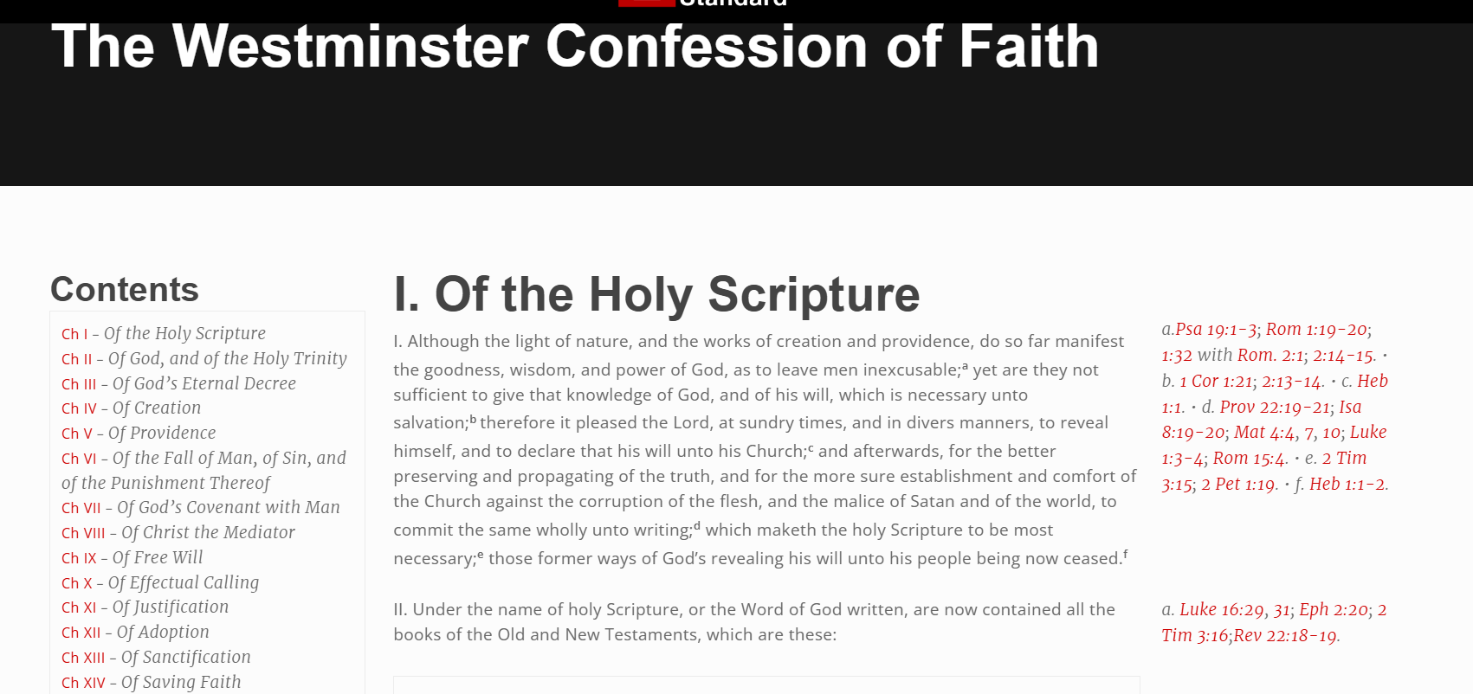
I. Of the Holy Scripture
I. Although the light of nature, and the works of creation and providence, do so far manifest the goodness, wisdom, and power of God, as to leave men inexcusable;a yet are they not sufficient to give that knowledge of God, and of his will, which is necessary unto salvation;b therefore it pleased the Lord, at sundry times, and in divers manners, to reveal himself, and to declare that his will unto his Church;c and afterwards, for the better preserving and propagating of the truth, and for the more sure establishment and comfort of the Church against the corruption of the flesh, and the malice of Satan and of the world, to commit the same wholly unto writing;d which maketh the holy Scripture to be most necessary;e those former ways of God’s revealing his will unto his people being now ceased.f ----
continued
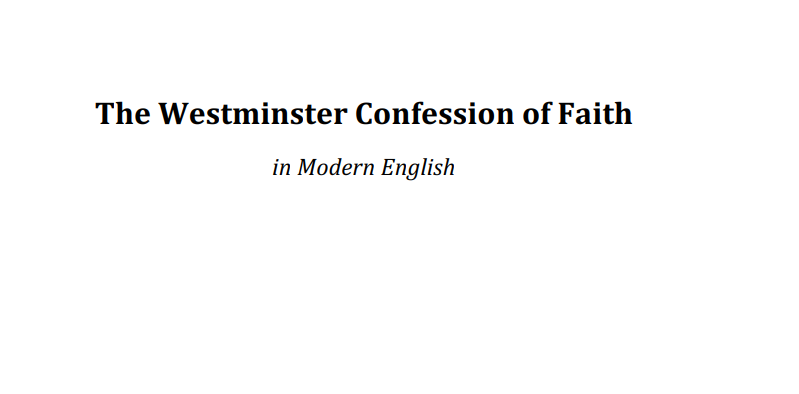
1. Our natural understanding and the works of creation and providence so clearly show God’s goodness, wisdom, and power that human beings have no excuse for not believing in him.1 However, these means alone cannot provide that knowledge of God and of his will which is necessary for salvation.2 Therefore it pleased the Lord at different times and in various ways to reveal himself and to declare that this revelation contains his will for his church.3 Afterwards it pleased God to put this entire revelation into writing so that the truth might be better preserved and transmitted and that the church, confronted with the corruption of the flesh and the evil purposes of Satan and the world, might be more securely established and comforted.4 Since God no longer reveals himself to his people in those earlier ways,5 Holy Scripture is absolutely essential.6 1. Rom 2.14-15, 1.19-20, Ps 19.1-4, Rom 1.32, 2.1. 2. 1 Cor 1.21, 2.13-14, 2.9-12, Acts 4.12, Rom 10.13-14. 3. Heb 1.1-2, Gal 1.11-12, Dt 4.12-14. 4. Prv 22.19-21, Lk 1.3-4, Rom 15.4, Mt 4.4,7,10, Is 8.19-20, Lk 24.27, 2 Tm 3.16, 2 Pt 3.15-16. 5. Heb 1.1-2, see General Note. 6. 2 Tm 3.15-16, 2 Pt 1.10, Lk 16.29-31, Heb 2.1-3. ---
continued
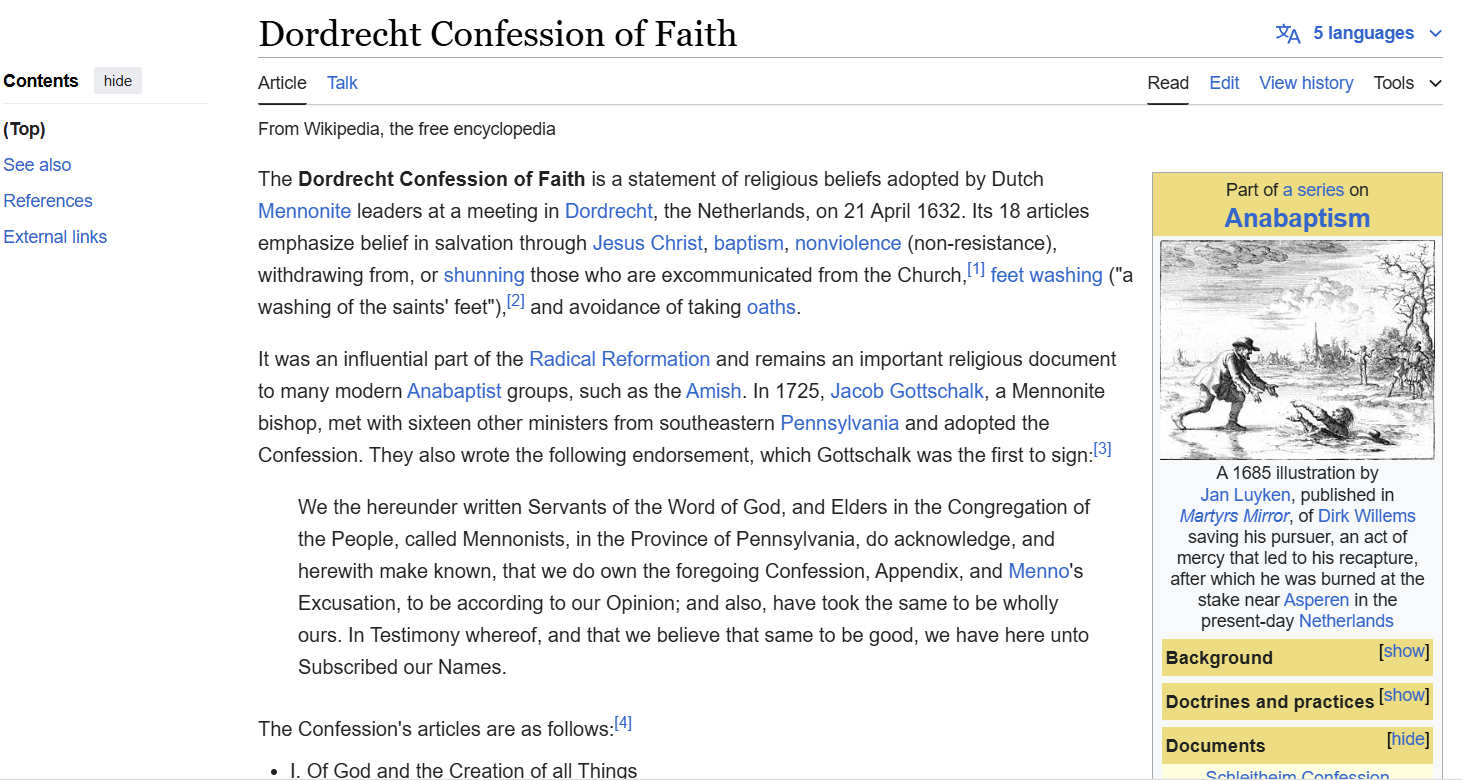
The Dordrecht Confession of Faith is a statement of religious beliefs adopted by Dutch Mennonite leaders at a meeting in Dordrecht, the Netherlands, on 21 April 1632. Its 18 articles emphasize belief in salvation through Jesus Christ, baptism, nonviolence (non-resistance), withdrawing from, or shunning those who are excommunicated from the Church,[1] feet washing ("a washing of the saints' feet"),[2] and avoidance of taking oaths.
It was an influential part of the Radical Reformation and remains an important religious document to many modern Anabaptist groups such as the Amish. In 1725, Jacob Gottschalk, a Mennonite bishop, met with sixteen other ministers from southeastern Pennsylvania and adopted the Confession. They also wrote the following endorsement, which Gottschalk was the first to sign:[3]
We the hereunder written Servants of the Word of God, and Elders in the Congregation of the People, called Mennonists, in the Province of Pennsylvania, do acknowledge, and herewith make known, that we do own the foregoing Confession, Appendix, and Menno's Excusation, to be according to our Opinion; and also, have took the same to be wholly ours. In Testimony whereof, and that we believe that same to be good, we have here unto Subscribed our Names.
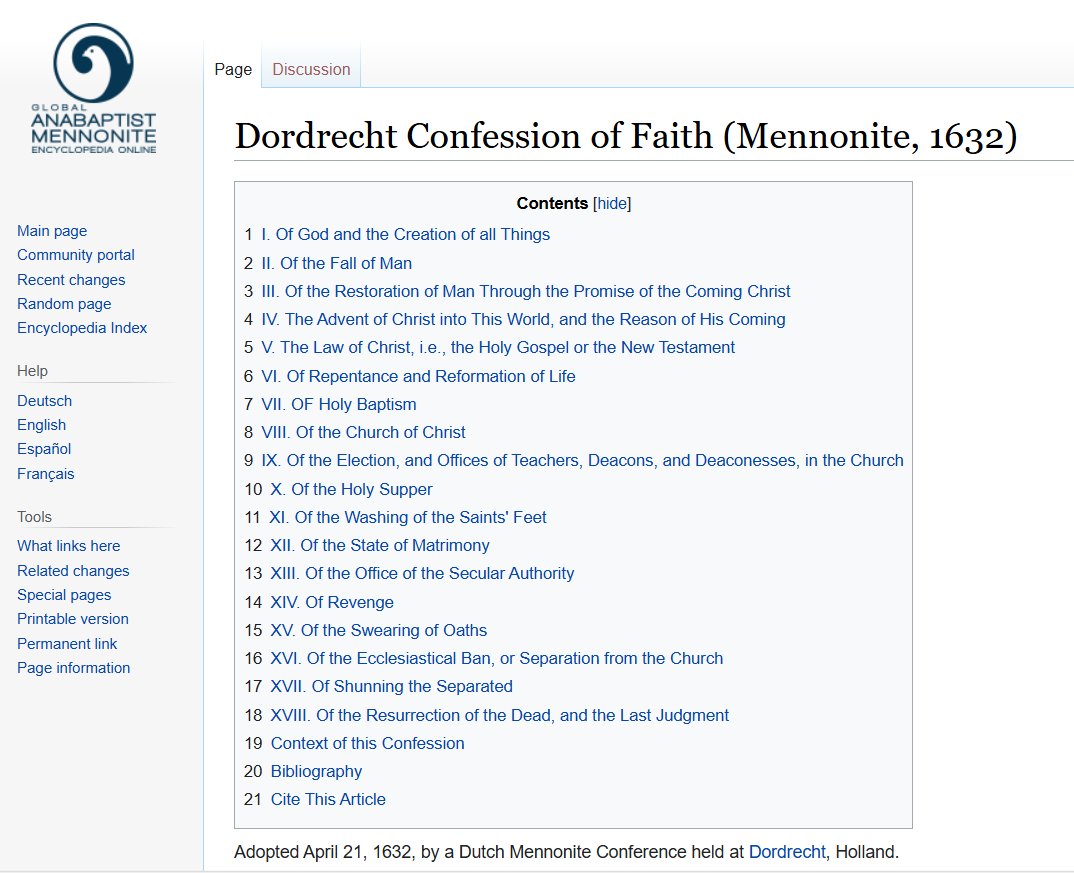
Contents
- 1 I. Of God and the Creation of all Things
- 2 II. Of the Fall of Man
- 3 III. Of the Restoration of Man Through the Promise of the Coming Christ
- 4 IV. The Advent of Christ into This World, and the Reason of His Coming
- 5 V. The Law of Christ, i.e., the Holy Gospel or the New Testament
- 6 VI. Of Repentance and Reformation of Life
- 7 VII. OF Holy Baptism
- 8 VIII. Of the Church of Christ
- 9 IX. Of the Election, and Offices of Teachers, Deacons, and Deaconesses, in the Church
- 10 X. Of the Holy Supper
- 11 XI. Of the Washing of the Saints' Feet
- 12 XII. Of the State of Matrimony
- 13 XIII. Of the Office of the Secular Authority
- 14 XIV. Of Revenge
- 15 XV. Of the Swearing of Oaths
- 16 XVI. Of the Ecclesiastical Ban, or Separation from the Church
- 17 XVII. Of Shunning the Separated
- 18 XVIII. Of the Resurrection of the Dead, and the Last Judgment
- 19 Context of this Confession
- 20 Bibliography
- I. Of God and the Creation of all Things
Since we find it testified that without faith it is impossible to please God, and that he that would come to God must believe that there is a God, and that He is a rewarder of them that seek Him; therefore, we confess with the mouth, and believe with the heart, with all the pious, according to the holy Scriptures, in one eternal, almighty, and incomprehensible God, the Father, Son, and Holy Ghost, and in none more, nor in any other; before whom no God was made or existed, nor shall there be any after Him: for of Him, and through Him, and in Him, are all things; to Him be praise and honor forever and ever, Amen. Hebrews 11:6; Deuteronomy 6:4; Genesis 17:1; Isaiah 46:8; 1 John 5:7; Romans 11:36.
Of this same one God, who worketh all in all, we believe and confess that He is the Creator of all things visible and invisible; that He, in six days, created, made, and prepared, heaven and earth, and the sea, and all that in them is; and that He still governs and upholds the same and all His works through His wisdom, might, and the word of His power. 1 Corinthians 12:6; Genesis 1; Acts 14:15.
- And when He had finished His works, and had ordained and prepared them, each in its nature and properties, good and upright, according to His pleasure, He created the first man, the father of us all, Adam; whom He formed of the dust of the ground, and breathed into his nostrils the breath of life, so that he became a living soul, created by God in His own image and likeness, in righteousness and holiness, unto eternal life. He regarded him above all other creatures, endowed him with many high and glorious gifts, placed him in the pleasure garden or Paradise, and gave him a command and prohibition; afterwards He took a rib from Adam, made a woman therefrom, and brought her to him, joining and giving her to him for a helpmate, companion, and wife; and in consequence of this He also caused, that from this one man Adam, all men that dwell upon the whole earth have descended. Genesis 1:27; Genesis 2:7, 17, 18, 22. ---
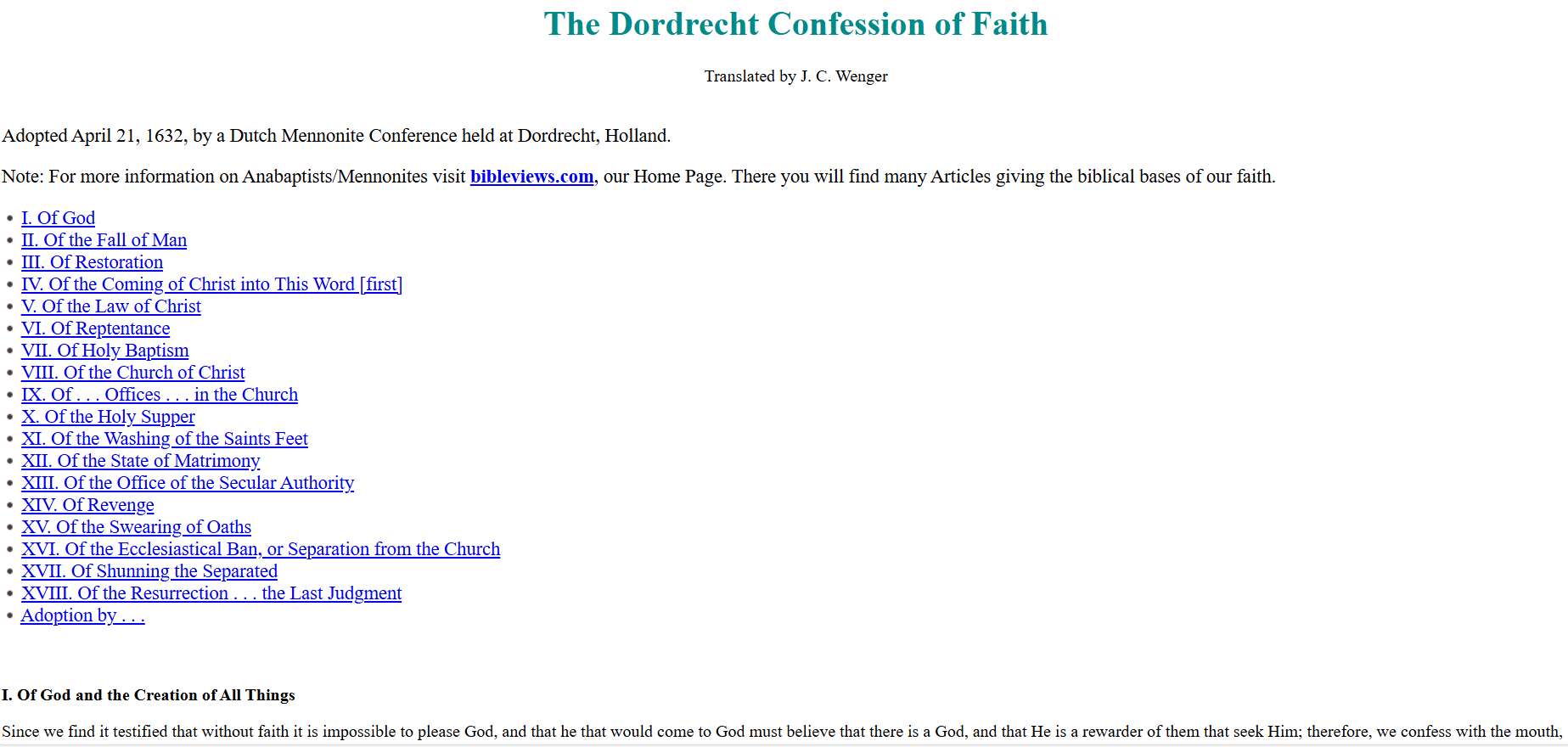
- I. Of God and the Creation of All Things
Since we find it testified that without faith it is impossible to please God, and that he that would come to God must believe that there is a God, and that He is a rewarder of them that seek Him; therefore, we confess with the mouth, and believe with the heart, with all the pious, according to the holy Scriptures, in one eternal, almighty, and incomprehensible God, the Father, Son, and Holy Ghost, and in none more, nor in any other; before whom no God was made or existed, nor shall there be any after Him: for of Him, and through Him, and in Him, are all things; to Him be praise and honor forever and ever, Amen. Heb. 11:6; Deut. 6:4; Gen. 17:1; Isa. 46:8; I John 5:7; Rom. 11:36.
Of this same one God, who worketh all in all, we believe and confess that He is the Creator of all things visible and invisible; that He, in six days, created, made, and prepared, heaven and earth, and the sea, and all that in them is; and that He still governs and upholds the same and all His works through His wisdom, might, and the word of His power. I Cor. 12:6; Gen. I; Acts 14:15.
- And when He had finished His works, and had ordained and prepared them, each in its nature and properties, good and upright, according to His pleasure, He created
the first man, the father of us Ml, Adam; whom He formed of the dust of the ground, and breathed into his nostrils the breath of life, so that he became a living soul, created by God in His own image and likeness, in righteousness
and holiness, unto eternal life. He regarded him above all other creatures, endowed him with many high and glorious gifts, placed him in the pleasure garden or Paradise, and gave him a command and prohibition; afterwards He
took a rib from Adam, made a woman therefrom, and brought her to him, joining and giving her to him for a helpmate, companion, and wife; and in consequence of this He also caused, that from this one man Adam, all men that
dwell upon the whole earth have descended. Gen. 1:27; 2:7, 17, 18, 22. ---